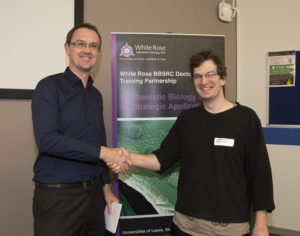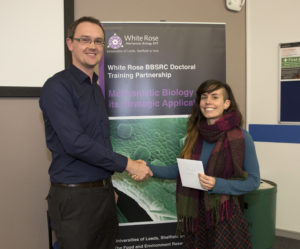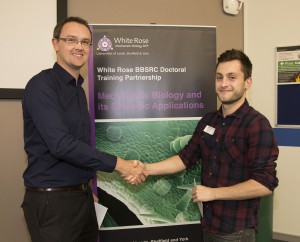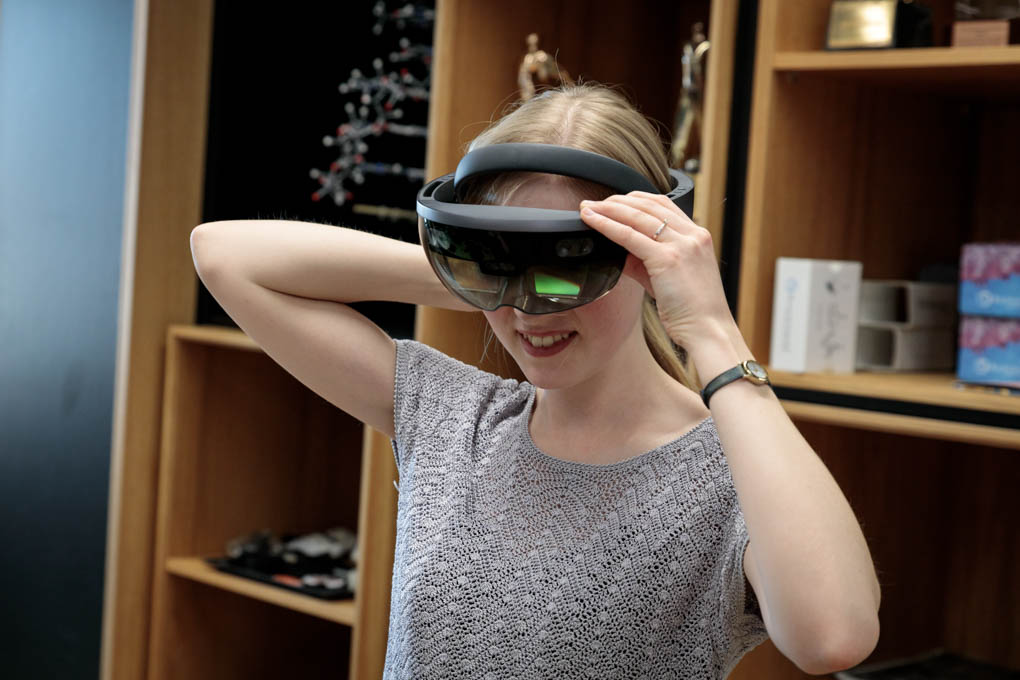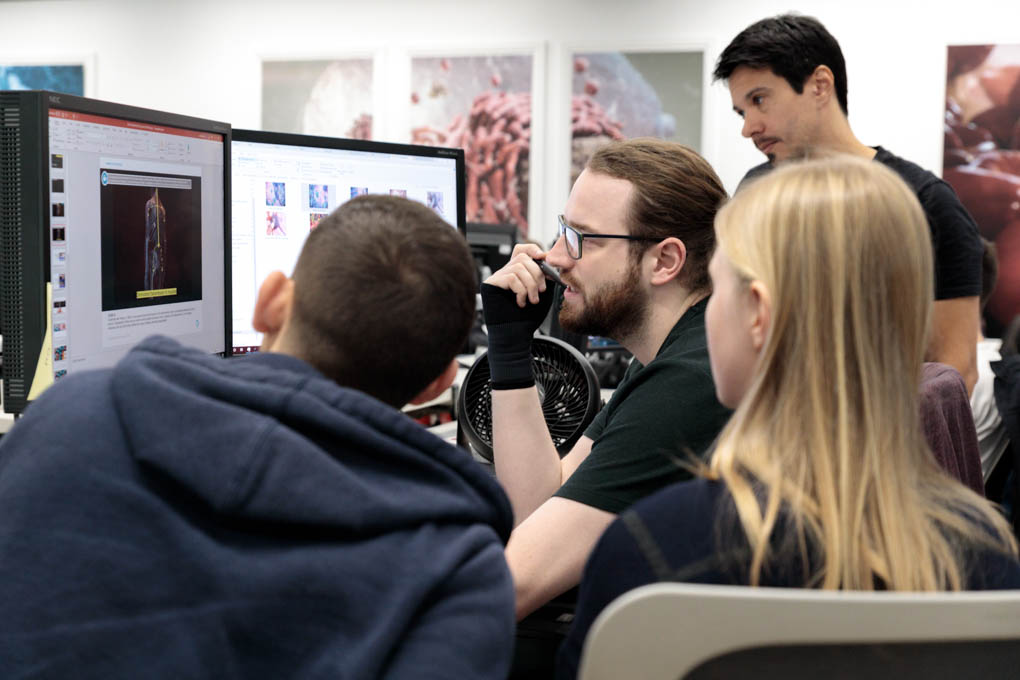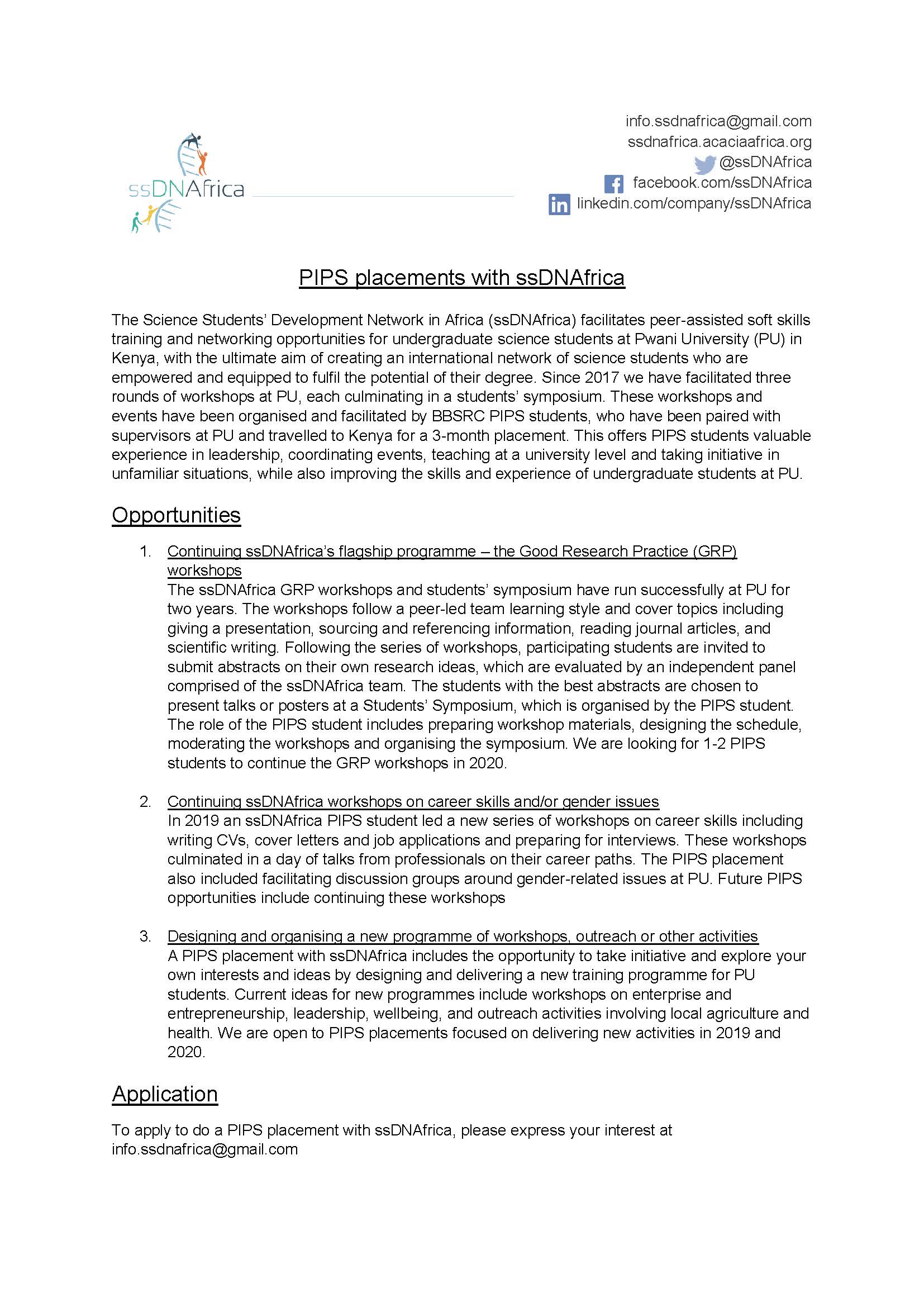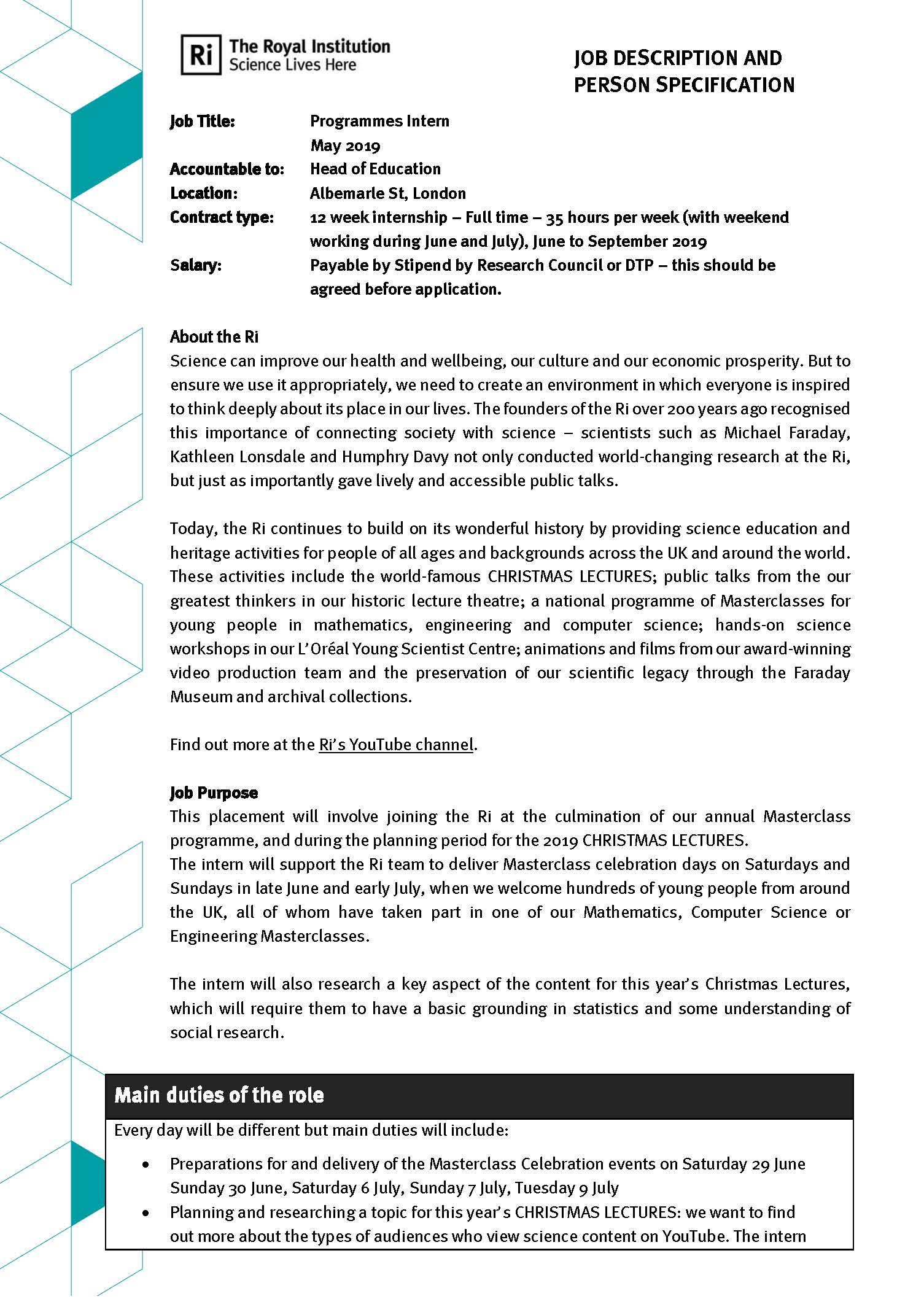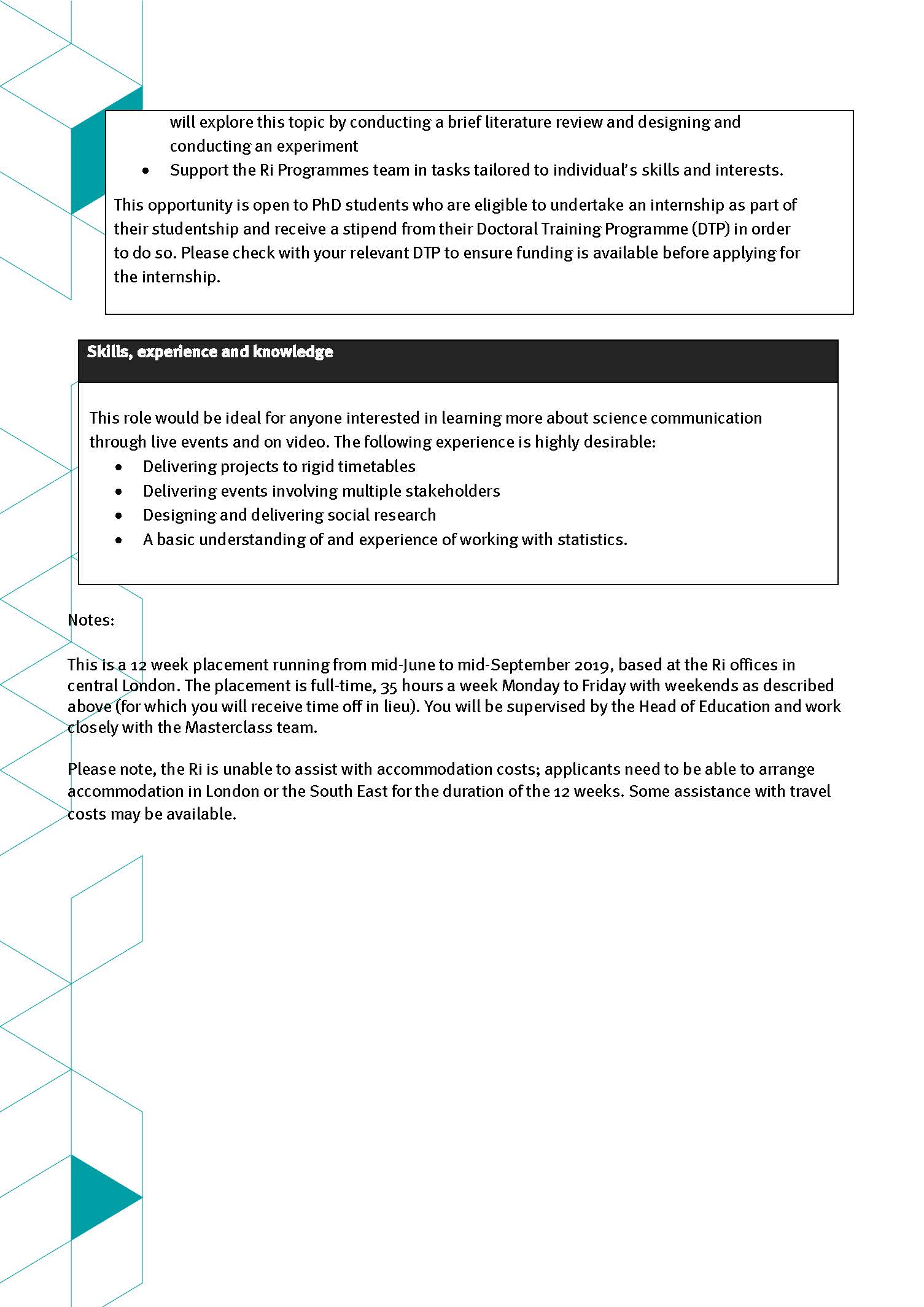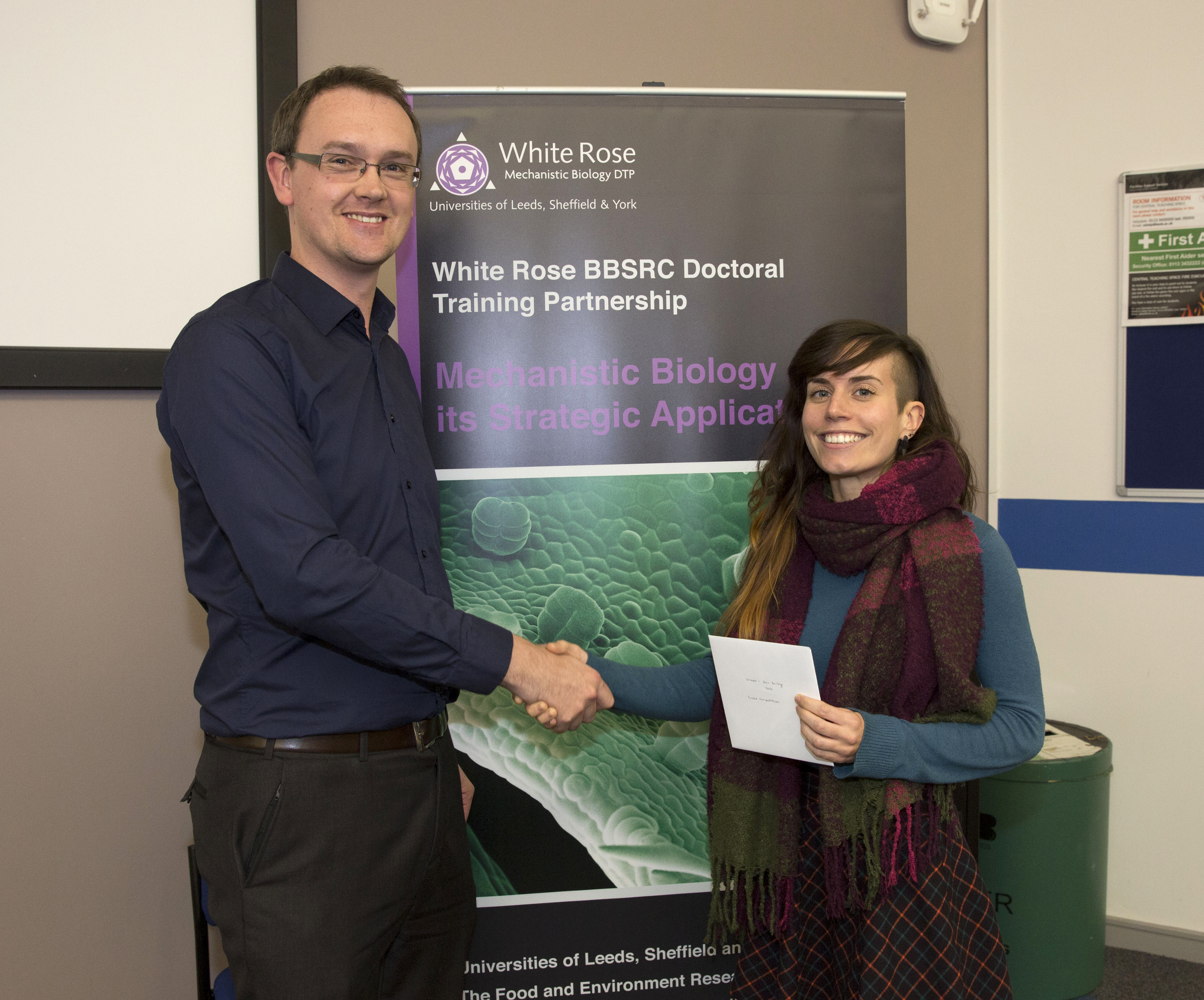| Alex Wright undertook his Professional Internship for PhD Students (PIPS) as a third year in 2019. Here’s what he had to say about his experience:
Where did you go and what did you do? |
| I worked for a life sciences technology commercialisation company called Swift Analytical. Swift is a consultancy and sales company, which specialises in the product development and subsequent marketing of novel life science technologies around the world. Swift generally specialises helping late-stage start-ups establish a targeted distribution network, and fine tune their product specification for market. Swift also works with established technology companies to set up global distribution networks for new products.
I worked primarily on the launch of the new iWashTM slide cleaning system. In my role I extensively tested the system and wrote its user manual, and provided face-to-face technical feedback to the manufacturer. I also wrote two technical articles for publication extolling the systems virtues, and wrote several press releases announcing its global sales launch and growing distribution network. I also worked on lead generation for the Regemat 3D bioprinting system, which directly led to two Skype calls with clients interested in purchasing the system. |
| What made you want to do that particular placement? |
| Firstly, it was conveniently situated in York which allowed me to stay living in Leeds, as the reclamation model for PIPS expenses made it impossible for me to live away from home for 3 months. I was interested in the industry surrounding the transfer of research technologies to the industrial marketplace. This placement offered the opportunity to be a member of a small team, and to be intimately involved with the final-stage pre-launch testing and marketing of new technology for the scientific industry. |
| How did you go about finding and planning your PIPS? |
| Swift Analytical were listed as previous employers for PIPS. I therefore emailed them with my CV and a covering letter. They got in contact by phone to organise a meeting. This was successful and we settled on a start date. |
| What have you gained from doing your PIPS? |
| I have gained a better understanding of the processes required to bring a product to market. This includes knowledge of the legal and economic requirements for a product to be successful. I have also gained experience of active sales processes, and methods to gain visibility for a product. |
| How would you sum up your PIPS experience? |
| Interesting change in perspective, as it allowed me to see different mindset required from the earliest stages of design in order to develop and successfully market new technology. Also it was a useful breather to recover from the stress of PhD research, allowing me to return refreshed and re-energised. |
| What advice would you give to other students about PIPS? |
| Do it earlier than your 3rd year. Even if you’re doing something boring, try hard and you might learn something interesting. Don’t do whatever you’re told or you’ll be made to do pointless grunt work beneath your level; stand up for yourself if you’re not getting to do what you were promised. |
Michaela Agapiou – The Story Collider
Michaela Agapiou was based in New York City for her internship with The Story Collider as part of her PhD programme , having approached them after spending many, many hours listening to podcasts while dissecting fruit fly testes. This is her first job outside of a lab, as she fell in love with science and research at a young age. She undertook her internship during 2019, whilst she was in her third year.
In Michaela’s own words…
I carried out my PIPS with The Story Collider, a non-profit organisation that produces true, personal stories about science. They have 60-70 live shows a year across the USA, Canada, New Zealand and the UK, as well as a weekly podcast that has been downloaded more than 9 million times.
After having spent many hours in the lab listening to, and being incredibly moved by, these stories, I approached The Story Collider after a live show I attended, to ask whether they would take me on as an intern. Fortunately, they said ‘Yes’ and a year later I moved to New York City for three months. Without the funding from BBSRC for this internship – through the White Rose BBSRC Doctoral Training Partnership, The Story Collider would not have been able to host me, as they are a small organisation with only three full-time staff.
From March-June 2019, I worked mostly with Erin Barker (Artistic Director) and Nisse Greenberg (Deputy Director). My main project was to review and categorise their back catalogue, which spans many years, and to help create new pages on their website to make these stories more discoverable and shareable based on their themes. I used new software and websites to complete this project and developed my organisational skills. I also kept up to date with the current stories being produced to help contribute to the podcast planning discussions.
I also developed and performed a story of my own for one of the shows. This was an incredible experience where I learnt about communicating science to a broader audience than I have in the past and in a very different style. It was great for my personal growth too, as my confidence in public speaking has improved. Through working on my own story with one of The Story Collider ’s senior producers, and in helping the production of other shows, I learnt about the process of developing a story from an initial written draft to it being told on stage. I got to see this process with six of The Story Collider’s producers and learn about their different styles of working with storytellers.
Through my main project and the live shows I attended (not just The Story Collider ’s but many other storytelling shows accessible to me whilST living in New York) I was really immersed in the storytelling world and further exposed to the art of it and how powerful personal narratives can be. I feel really passionate about the mission of The Story Collider to humanise science, and show that science belongs to us all and is part of everyone’s lives through these personal stories. It was an honour to work with them, learn from them and contribute to this mission for three months and I hope to work with them again in the future.
Sarah Gratton – Random42 Scientific Communications
One of our Student Reps, Sarah Gratton, is featured in a great blog published by her Professional Internships for PhD Students (PIPS) host, Random42 Scientific Communications. Read what she got up to:
https://random42.com/company-news/scientific-internships-at-random42/
Amy Tooke – The Great North Museum
Amy Tooke undertook her Professional Internship for PhD Students (PIPS) during 2019 (whilst she was in her second year) at The Great North Museum, Newcastle-upon-Tyne.
Amy said,
“I really did enjoy my PIPS and think it was such a lucky and useful experience for me to be able to have.”
Amy wrote a testimonial for the museum’s website:
https://greatnorthmuseum.org.uk/learning/learning-student-engagement
There are 2 Amy’s on the list but it is obvious which one is ‘our Amy’!
Biochemical Society Careers Intern – Deadline: 2 Mar 2020

Careers intern
Internship: 35hrs/week (full time), in central London.
This three-month placement is intended to be taken as part of a funded studentship and students should continue to receive a stipend from their funder during the placement. The Biochemical Society is unable to accept interns without funding for this role. (Note: White Rose BBSRC DTP students will continue to receive their stipend during their Professional Internship for PhD Students (PIPS) placement).
The Biochemical Society offers support towards travel and accommodation costs for internships, up to a total cost of £2,400 for a three-month placement, payable through expenses.
Start date: April/May (flexible start) (Note: White Rose BBSRC DTP students will need to access this funding, in addition to the PIPS standard allowance provided by the DTP, as living costs in London are usually expensive).
The Biochemical Society runs a broad education, training and public engagement programme, as part of which we develop careers materials and activities for a wide range of audiences across the molecular bioscience community. We are looking for a careers intern to assist with the team’s work and develop a new activity targeted at Key Stage 3 audiences.
Responsibilities will include:
- Developing a new careers project targeted at teachers of key stage 3 students (age 10-14). This project will aim to embed careers materials into school curricula and highlight the breadth of career paths in the molecular biosciences
- Reviewing existing careers material to ensure they are still relevant and up-to-date
- Supporting the development of new careers articles, case studies and resources.
- Monitoring the discussion forums of the Society’s ‘Biochemistry: the molecules of life’ Massive Open Online Course (MOOC)
Skills required
- Interest in education and careers
- Excellent attention to detail
- Good communication skills
- Good time management skills
- Computer literate
How to apply
Please send a CV and covering letter to Lorenza Giannella, Training Manager: lorenza.giannella@biochemistry.org
Deadline for applications: Monday 2nd March 2020.
Contact
Lorenza Giannella, Training Manager
Email: lorenza.giannella@biochemistry.org
Tel: 07976903668
Kew Gardens Science Festival Intern – Apply by: 14 Feb 2020

Royal Botanic Gardens Kew – Science Festival Intern
Deadline for applications: Friday 14th February 2020.
When
There will be at least two placements, the first running roughly March to May and the second from early May to early August.
Where
Royal Botanic Gardens, Kew, (Richmond, London, TW9 3AE), with some travel to Wakehurst (Ardingly, Haywards Heath, Sussex, RH17 6TN)
Directorate: Science
Department: Office of the Science Directorate
About The Royal Botanic Gardens, Kew
Kew is a global resource for plant and fungal knowledge. As a volunteer Science Festival Intern, you will join a vibrant team of scientists, support staff and volunteers, contributing to the achievement of one or more of Kew’s three strategic science priorities:
- To document and conduct research into global plant and fungal diversity, and its uses for humanity
- To curate and provide data-rich evidence from Kew’s unrivalled collections as a global asset for scientific research
- To disseminate our scientific knowledge of plants and fungi, maximising its impact in science, education, conservation policy and management
These priorities enable us to curate, enhance, use, explore and share Kew’s global resources – providing robust data and a strong evidence base for our UK and international stakeholders.
Internship overview
Supervisors: Richard Gianfrancesco, Mimi Tanimoto.
Science internships provide valuable training and professional work experience. Interns work alongside Kew’s leading experts and have access to our world-renowned collections of plants and fungi, library and facilities.
You will contribute towards the planning and delivery of our annual Kew Science Festival; in 2020 it will run twice, once at Wakehurst in late May and subsequently at Kew in late July. You will work with our research, communications and events staff to help develop a range of hands-on science activities, games, interactive experiments, talks and behind-the-scenes tours suitable for different ages. Your responsibilities will also include support for marketing and promotion, developing and delivering communications plans, proofreading, copy editing, preparing briefings, evaluation, scheduling, general administration, purchasing, operations and help with running the event.
Training and professional development provided
- Science communication including social media, writing, copy editing and public engagement
- Event coordination
- Administration skills
About you
You will be:
- Over 18 years old
- A PhD student seeking experience in public engagement with science
You will have:
- A degree in a biological science-related discipline, which includes plant science or ecology components
- A demonstrated interest in biodiversity, its sustainable use and conservation
- An operating knowledge of Microsoft Office (Word, Excel and Powerpoint)
- Excellent attention to detail, performing work to a high standard and using initiative to solve problems and troubleshoot
- Flexible attitude to work as project activities may change/evolve
- Evidence of the ability to work on your own initiative and as part of a team
What you can expect from us
- A full induction and appropriate training with ongoing support
- Well-rounded work experience within specific fields to develop knowledge, understanding and skills
- To be allocated clear roles and responsibilities
- To be treated fairly and with respect
- A friendly and dedicated team
- Access to Kew’s collections of living and preserved plants and fungi, as well as its economic botany and Library, Art & Archive collections
- An opportunity to participate in Kew’s internationally renowned science and conservation programmes
- Reimbursement of travel expenses between Kew and Wakehurst
What we expect from you
- To carry out your activities in a way that corresponds with Kew’s aims and values
- To attend training and meetings, as required
- To learn about the work of Kew
- To participate in the life of the organisation
- Commitment to the hours and days agreed with your supervisor
- To be reliable and punctual
- To follow Kew policies and procedures
How to apply
Please send your CV and a covering letter detailing your reasons for applying for this internship, including details of an academic referee (e.g. your university tutor or supervisor). Applications should be sent to kewscience@kew.org
Deadline for applications: Friday 14th February 2020.
Shortlisted applicants will have an opportunity for a Skype discussion of the project with the Science Festival co-ordinators.
Contact
For further information, please contact:
Pat Griggs, Science Administrator (Education)
Phone: 020 8332 5625
Email: kewscience@kew.org
UKRI-BBSRC Agriculture & Food Security Impact Review of the ZELS Research Programme – Deadline: 26th Feb 2020

The anticipated start date for this placement is April 2020 and the closing date for applications is 26 February 2020.
Professional Internship to support BBSRC UKRI Agriculture & Food Security impact review of the Zoonoses and Emerging Livestock Systems (ZELS) research programme
An opportunity exists for a Professional Internships for PhD Students (PIPS) placement within the Agriculture and Food Security (AFS) science strategy team of BBSRC UKRI, to compile evidence of economic and societal impact in the UK and overseas arising from the research council’s investment in the ZELS programme. This role will provide the intern with insight of strategy development at BBSRC and within government, and its implementation nationally and internationally in the field of basic biology underpinning agriculture and food.
Background to Sustainable Agriculture and Food Security at BBSRC
Bioscience for sustainable agriculture and food is one of three key strategic research priorities set out in BBSRC’s strategic vision: https://bbsrc.ukri.org/about/vision-mission-strategy/vision/.
BBSRC’s AFS remit covers arable, horticultural, forage and non-food crops, farmed animals (livestock, poultry and aquaculture), agricultural systems including soil, and the related food chains. The Research in Agriculture and Food Security Strategic Framework (https://bbsrc.ukri.org/documents/agriculture-food-security-strategic-framework-pdf/) outlines BBSRC’s priorities and goals in this area.
BBSRC is the UK’s largest public sector funder of AFS research and invested over £131 billion between 2016-17. It is essential BBSRC works to maximise the benefits from the research it invests in, to further support funding to the UK’s world-leading bioscience research base.
The ZELS programme (https://bbsrc.ukri.org/research/international/engagement/global-challenges/zels/) supports research and training to reduce the impact of zoonoses on the poor and their livestock in developing countries. It further aims to bring together researchers from various disciplines and from around the globe, and to enhance the scientific capabilities of southern partners.
The programme is inter- and multi-disciplinary, and includes biological science, environmental science, mathematical sciences, public health and animal health sciences and the social sciences.
Launched in 2012, the first tranche of the initiative, worth £18.5M of research funding, was made up of 11 projects investigating emerging and endemic zoonotic diseases in developing countries.
In addition to the research projects, since 2015, a cohort of 16 students from the UK and developing countries received doctoral training in ZELS related research, to the value of £1.5M.
The programme is funded by BBSRC in partnership with the Defence Science and Technology Laboratory (Dstl), the Department for International Development (DFID), the Economic and Social Sciences Research Council (ESRC), the Medical Research Council (MRC) and the Natural Environment Research Council (NERC).
In 2019, a further tranche of £2.6M funding was made available by DFID to take earlier or ongoing ZELS research to the stage of practical application to deliver benefit and impact in developing countries. Six projects have been awarded.
Role of the PIPS intern
A PIPS intern is sought to assist with the analysis and dissemination of impact generated by the ZELS programme. Taking the projects’ impact statements as a starting point, you will set up meetings with, and interview, senior representatives from each of the ZELS projects to draw together the spectrum of tangible benefits derived from the ZELS programme. Using the output of your analysis, you will work with the ZELS management team to develop an impact report showcasing the widespread impacts from ZELS investments, including research and innovation;
research capacity; policy making; human, animal and ecosystem heath; and socioeconomic development.
The role will be located in the AFS team of our Science Strategy Group and provides a unique opportunity to learn about the impacts of the science UKRI funds in partnership with Government Departments and how science strategy is developed and implemented across the UK and at the global scale.
The PIPS intern should have enthusiasm for science, in particular fundamental research and biotechnologies, and be able to demonstrate excellent organisational and interpersonal abilities, and written and oral communication skills. This placement offers an exciting professional development opportunity as well as a chance to learn about other activities of BBSRC and UKRI.
How to apply
To apply for this PIPS placement, please complete the attached application form and return it to pips@bbsrc.ac.uk by 26 February 2020.
You should be available to start your placement in April 2020.
All applications should be sent to pips@bbsrc.ukri.org
Closing date for applications: Wednesday 26th February 2020
CLICK TO DOWNLOAD APPLICATION FORM
Contact
Questions about this placement can be directed to Amanda Read (amanda.read@bbsrc.ukri.gov).
Institute of Cancer Research Public Engagement – Deadline: 28th Feb 2020
![]()
Public Engagement Internship
Who we are
The ICR is one of the world’s most influential cancer research institutes with an outstanding record of achievement dating back more than 100 years. We provided the first convincing evidence that DNA damage is the basic cause of cancer, laying the foundation for the now universally accepted idea that cancer is a genetic disease. Today, we lead the world at isolating cancer-related genes and discovering new targeted drugs for personalised cancer treatment. Together with our partner The Royal Marsden, we are rated in the top five cancer centres globally.
The ICR is committed to attracting, developing and retaining the best minds in the world to join us in our mission – to make the discoveries that defeat cancer.
Who are we looking for?
We are looking for a PhD student to support the organisation and delivery of public engagement activities and events as part of the Communications directorate at The Institute of Cancer Research, London. In this Public Engagement Intern role you will gain an insight into engaging creatively with the public about world-class, cutting-edge research as well as useful experience in event planning and management.
We’re looking for an enthusiastic PhD student or postdoc who is highly motivated and organised, and has strong communication skills, including the ability to work with a range of internal and external contacts. We’re looking for someone with excellent time management skills, the ability to plan and prioritise their workloads and show initiative.
The ideal candidate would like to gain experience of organising events, developing communication and engagement materials, and have an interest and understanding of public engagement with science and research. A background in science is desired but not essential.
What will you be doing?
The Public Engagement Intern will work closely with the Public Engagement Officer to plan, manage and evaluate public engagement events and activities at The Institute of Cancer Research (ICR). Every year, the ICR takes part in science festivals around its sites in Sutton and Chelsea, including the Great Exhibition Road Festival, creating and delivering meaningful engagements with the local community. The role of the Public Engagement Intern will be to coordinate the ICR’s contribution to these events.
A typical day may include liaising with external events organisers about festival practicalities, working with researchers to develop activity scripts, or co-chairing event briefing meetings with ICR staff and student volunteers. You will also be involved in producing content for the ICR’s internal communication channels and you will work with the Digital team to produce external content about public engagement events for the ICR’s social media channels.
What will you gain?
As part of your internship you will develop a range of transferable skills. You will gain experience of managing events, coordinating a team of volunteers and developing creative engagement activities and experiences for public groups. You will gain an understanding of public engagement in the higher education sector and develop your skills communicating with public groups about complex scientific research as part of the Communications directorate of a leading cancer research organisation.
How to apply
Please email Daisy Henesy (daisy.henesy@icr.ac.uk), Public Engagement Officer, with your CV and a one page personal statement, describing why you would be the ideal candidate for this internship.
Deadline: Applications must be received by 5pm on Friday 28 February 2020.
Interviews will take place at our Chelsea site w/c Monday 2 March 2020.
If your application is successful, you will be offered an internship and we will arrange a suitable start date with you.
Contact
Please get in touch with Daisy Henesy (daisy.henesy@icr.ac.uk) if you have any questions about the internship.
Leeds City Council Healthy Holidays Programme – Deadline: Mon 3rd Feb 2020

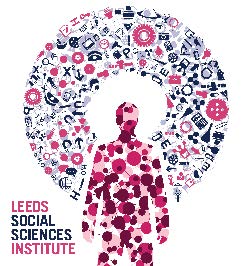
Leeds Social Sciences Institute (LSSI) Post Graduate Research Student Placement Opportunity
An exciting opportunity has arisen for a PGR student to work with the Leeds City Council’s Financial Inclusion team.
The proposed project is an opportunity to work with policymakers at Leeds City Council who are aiming to develop a longer term approach to the Healthy Holidays Programme and will be able to achieve this through strengthening its evidence base.
Healthy Holidays is an initiative designed to tackle the issue of food insecurity, and ensure children and low income families are able to access a healthy meal and fun activities during the school holidays. The Council has supported and provided funding for Healthy Holiday programmes since 2018 and has recognised the importance of this work at a cross-directorate level. This work has also brought together support from the third sector and private sector and is an example of how the city is coming together to tackle food insecurity and support families out of poverty.
Details of the placement
The research study would involve a review of previous evaluation and monitoring reports, extracting key issues and highlighting any areas which can be improved. In 2019 the programme produced 3 evaluation reports, one for provision by third sector organisations, one for school provision and one for Community Hubs. All three evaluations contained facts and figures on the number of children supported on the scheme and meals provided but also included a wealth of positive feedback from children, parents, volunteers, school teachers and people involved in the projects. This ranged from children improving in confidence and making friends, being more settled when going back to school to parents engaging with wider services such as job shops and benefits advice. The anecdotal evidence from these reports highlighted how the programme is doing more than tackling hunger during school holidays.
Once a review of the evaluation reports has been carried out, the next phase of the placement would be to develop and recommend indicators that can be used to produce a framework to capture the wider impacts of Healthy Holidays in order to help the Council and partners in the development of this programme.
The placement is part time and the number of working hours per week can be flexible, the start date is ASAP and the duration is 12 weeks.
Skills required
- Qualitative and quantitative analysis and report writing skills
- Experience of producing evaluation frameworks
- Ability to work independently and meet deadlines
- A high level of interpersonal and communication skills, including the ability to communicate effectively with relevant stakeholder groups
Benefits and skills developed for the student
An opportunity to work directly with policy makers across the local authority and practical experience of developing evidence based policies that impact communities. The anticipated output is the development of an evaluation framework that will help capture the wider impacts of Healthy Holidays.
When
130 hours in total beginning ASAP for 10 – 12 weeks. Weekly hours flexible and to be agreed.
(NOTE TO DTP STUDENTS: This placement is part-time. You will need to either negotiate full-time for 10-12 weeks (3 months) or agree to extend the length of the placement on a part-time basis).
Where
The project will primarily be office based within Leeds City Centre, between Merrion House and Leeds Community Foundation. The student will be supervised by the Financial Inclusion team and will be based at Merrion House.
How to apply
If you are interested, please send your CV, one page Cover Letter and confirmation from your supervisor to h.e.crow@leeds.ac.uk
Deadline
Apply by 5pm on Monday 3rd February 2020.
Contact
Hannah Crow
Leeds Social Sciences Institute (LSSI) Coordinator
Impact Acceleration Account (IAA) Manager
Social Sciences Building | Room 11.15
University of Leeds | Leeds LS2 9JT
0113 34 38468
LSSI website: www.lssi.leeds.ac.uk
LSSI Twitter: UoLSSI (@UoLSSI)
BBSRC ZELS review – Deadline: 20 Jan 2020

Professional Internship to support BBSRC UKRI Agriculture & Food Security impact review of the Zoonoses and Emerging Livestock Systems (ZELS) research programme
An opportunity exists for a Professional Internships for PhD Students (PIPS) placement within the Agriculture and Food Security (AFS) science strategy team of BBSRC UKRI, to compile evidence of economic and societal impact in the UK and overseas arising from the research council’s investment in the ZELS programme. This role will provide the intern with insight of strategy development at BBSRC and within government, and its implementation nationally and internationally in the field of basic biology underpinning agriculture and food.
Background to Sustainable Agriculture and Food Security at BBSRC
Bioscience for sustainable agriculture and food is one of three key strategic research priorities set out in BBSRC’s strategic vision (https://bbsrc.ukri.org/about/vision-mission-strategy/vision/.
BBSRC’s AFS remit covers arable, horticultural, forage and non-food crops, farmed animals (livestock, poultry and aquaculture), agricultural systems including soil, and the related food chains. The Research in Agriculture and Food Security Strategic Framework (https://bbsrc.ukri.org/documents/agriculture-food-security-strategic-framework-pdf/) outlines BBSRC’s priorities and goals in this area.
BBSRC is the UK’s largest public sector funder of AFS research and invested over £131 billion between 2016-17. It is essential BBSRC works to maximise the benefits from the research it invests in, to further support funding to the UK’s world-leading bioscience research base.
The ZELS programme
The ZELS programme (https://bbsrc.ukri.org/research/international/engagement/global-challenges/zels/) supports research and training to reduce the impact of zoonoses on the poor and their livestock in developing countries. It further aims to bring together researchers from various disciplines and from around the globe, and to enhance the scientific capabilities of southern partners.
The programme is inter- and multi-disciplinary, and includes biological science, environmental science, mathematical sciences, public health and animal health sciences and the social sciences.
Launched in 2012, the first tranche of the initiative, worth £18.5M of research funding, was made up of 11 projects investigating emerging and endemic zoonotic diseases in developing countries. In addition to the research projects, since 2015, a cohort of 16 students from the UK and developing countries received doctoral training in ZELS related research, to the value of £1.5M.
The programme is funded by BBSRC in partnership with the Defence Science and Technology Laboratory (DSTL), the Department for International Development (DFID), the Economic and Social Sciences Research Council (ESRC), the Medical Research Council (MRC) and the Natural Environment Research Council (NERC).
In 2019, a further tranche of £2.6M funding was made available by DFID to take earlier or ongoing ZELS research to the stage of practical application to deliver benefit and impact in developing countries. Six projects have been awarded.
Role of the PIPS intern
A PIPS intern is sought to assist with the analysis and dissemination of impact generated by the ZELS programme. Taking the projects’ impact statements as a starting point, you will set up meetings with, and interview, senior representatives from each of the ZELS projects to draw together the spectrum of tangible benefits derived from the ZELS programme. Using the output of your analysis, you will work with the ZELS management team to develop an impact report showcasing the widespread impacts from ZELS investments, including research and innovation;
research capacity; policy making; human, animal and ecosystem heath; and socioeconomic
development.
The role will be located in the AFS team of our Science Strategy Group and provides a unique opportunity to learn about the impacts of the science UKRI funds in partnership with Government Departments and how science strategy is developed and implemented across the UK and at the global scale.
The PIPS intern should have enthusiasm for science, in particular fundamental research and biotechnologies, and be able to demonstrate excellent organisational and interpersonal abilities, and written and oral communication skills. This placement offers an exciting professional development opportunity as well as a chance to learn about other activities of BBSRC and UKRI.
Contact
Questions about this placement can be directed to Amanda Read email: amanda.read@bbsrc.ukri.gov
How to apply
To apply for this PIPS placement please complete the attached application form and return it to pips@bbsrc.ac.uk by 20 January 2020.
You should be available to start your placement no later than week commencing 23 March 2020.
CLICK HERE TO DOWNLOAD APPLICATION FORM
BBSRC Neuroscience – Deadline: 24 Jan 2020
Professional Internship opportunity: developing a BBSRC narrative for neuroscience and behaviour
Within BBSRC’s Bioscience for an Integrated Understanding of Health (BIUH) sector, there is an exciting opportunity for a Professional Internship for PhD Students (PIPS) placement to input into the development of BBSRC’s research strategy for neuroscience and behaviour. This interesting and challenging internship will provide an intern with insight into strategy development by the UK’s leading bioscience research funder.
Background to BIUH
The BIUH sector covers a diverse range of scientific disciplines, including healthy ageing, diet and health, regenerative biology, immunology and neuroscience. In 2017/18 BBSRC’s research funding in this sector totalled £56M. Both fundamental neuroscience and neuroscience underpinning health are within BBSRC’s remit in this portfolio. BBSRC’s annual neuroscience and behaviour research spend is approximately £30M.
Scientific areas covered within this portfolio, include (but are not limited to): fundamental neuroscience research, pain, cognition, mental health, sleep, behaviour, tools and technology development, satiety, stress, degeneration and neuro musculoskeletal systems. They would like to identify their unique offering in this space, and communicate this clearly with Government, academia, industry and the public; which is where this internship is timely.
Background to Bioscience for an Integrated Understanding of Health
Bioscience for an Integrated Understanding of Health is one of three key strategic research priorities set out in BBSRC’s Strategic Plan (http://www.bbsrc.ac.uk/documents/strategic-plan-pdf/ ). The scope of the priority takes in bioscience and enabling biotechnology that informs, and delivers research impact from, a better understanding of healthy human systems, and exploiting the value of comparative biology and ‘one health’ approaches for the improved health and welfare of both humans and animals.
In April 2015, BBSRC launched the Bioscience for Health Strategic Framework 2015 – 2020 (http://www.bbsrc.ac.uk/documents/bioscience-for-health-booklet/ ), outlining BBSRC’s priorities and goals for the next 5 years in this important area.
Background to Bioscience for an Integrated Understanding of Health strategy development at BBSRC
BBSRC funds a large body of world class science directly aligned to Bioscience for an Integrated Understanding of Health of ~£56M per annum, which is built on a foundation of ~£126M investment in underpinning world class bioscience. This body of research is a unique portfolio providing a crucial contribution to UK’s health research landscape. BBSRC funds research into healthy human systems and both animal health and disease. Research focussed on human diseases falls outside of BBSRC’s scientific remit, but working with other funders, we seek to maximise the value of shared research objectives and knowledge between studies of human health and animal health and disease, through comparative ‘one biology’ approaches, and a ‘one health’ approach to zoonosis research.
Bioscience for an Integrated Understanding of Health research investment is specifically supported through Responsive Mode priority areas in:
• Animal health of livestock species, underpinning future ‘One Health’ approaches
• Food, nutrition and health, launched in May 2014, to build on existing strength in understanding the fundamental mechanisms by which food influences long-term health
• Healthy ageing across the lifecourse, with particular strength in the comparative, systems and cell biology of fundamental mechanisms of ageing, from development to old age
• the Replacement, Refinement and Reduction (3Rs) in research using animals
• Welfare of managed animals
The BBSRC Health Portfolio Review identified particular and unique research strengths in further areas that underpin Bioscience for Health, including other research portfolios and activities such as neuroscience and immunology.
Role of the PIPS intern
We are looking for a PIPS intern to join BBSRC’s BIUH team, where they will work to support the development of forward strategy for potential future neuroscience and behaviour investment, as well as providing evidence to showcase the impact of BBSRC’s existing neuroscience and behaviour portfolio. This is a varied and interesting role. The intern will gain experience of BBSRC and wider UKRI strategy and policy development, as well as an understanding of the research funding landscape in this area. They will:
– Work closely with an external neuroscience and behaviour expert working group and secretariat, to gain an understanding of the wider funding landscape, identifying strengths, gaps and opportunities for BBSRC communities
– Work with the BIUH team and wider organisation to develop a BBSRC narrative for neuroscience and behaviour, particularly with relevance to areas such as the gut-brain axis, cognitive computational neuroscience, mental health and/or artificial intelligence
– Produce case studies for publication for a range of audiences (including the general public, government, researchers) demonstrating the impact of BBSRC neuroscience and behaviour activities
– Carry out analysis of BBSRC’s neuroscience and behaviour portfolio of investments to inform future strategy development
– Input into the development of forward strategy.
The PIPS intern should have enthusiasm for science, in particular fundamental research and biotechnologies, as well as good organisational, communication, and interpersonal skills. This placement will also be an excellent professional development opportunity as well as a chance to learn about other activities of BBSRC and UKRI.
Experience gained on the project:
• Opportunity to provide thought leadership in an emerging area of research and innovation
• Synthesizing information to inform different audiences, including senior members of UKRI-BBSRC, academics, industry and policymakers.
• Presenting work to senior academics, members of industry, and policymakers at Strategy Panel or Expert Working Group meetings (dependent upon timing).
• Experience of cross team and organisation working work the Capability and Innovation Domain and the Strategy and Programmes Group within UKRI-BBSRC.
• Opportunity to develop forward strategy for Bioscience for an Integrated Understanding of Health
• Experience of liaising with external stakeholders and grant holders.
• Further develop planning and project management skills, in order to meet deadlines.
Contact
Questions on this placement can be directed to Iain Templeman email: iain.templeman@bbsrc.ukri.org
How to apply
If you would like to apply for this PIPS placement, then please complete the attached application form and return it to pips@bbsrc.ukri.org by 24th January 2020.
You should be available to start your placement in Spring/Summer 2020.
CLICK HERE TO DOWNLOAD APPLICATION FORM
BBSRC Frontier Bioscience – Deadline: 6 Jan 2020

PIPS opportunity: Communicating the Impact of Genomics with the BBSRC Frontier Bioscience team.
An exciting opportunity has arisen for a motivated PhD student to join the UKRI-BBSRC Frontier Bioscience team to work on increasing the profile of the long-term impacts that BBSRC’s legacy of investment in genomics has generated for science and society. This 3-month internship would suit a PhD student with interests in genomics, biotechnology, science communication (SciComm) or public engagement. This internship will involve gathering evidence from a range of sources, including key stakeholders both inside and outside of the organization, and working collaboratively with the UKRI Communications and Public Engagement team to develop and disseminate an accessible narrative. There will be ample scope to shape the direction of the project based on the candidate’s own skills and interests and you will also gain broad exposure to research strategy and programmes activities within UKRI-BBSRC.
Background to UKRI-BBSRC Frontier Biosciences
In 2019 UKRI-BBSRC published its new Delivery Plan outlining three high-level objectives which underpin its ambitious vision for UK bioscience, including Advancing the Frontiers of Bioscience Discovery. In order to deliver on the enabling potential of bioscience in tackling global challenges, strategic long-term support for cutting-edge, fundamental research at the frontiers of bioscience discovery is necessary to build the foundations for future impact.
The legacy of BBSRC support in genomics spans decades since its first establishment in 1994. Today, genomics is a rapidly advancing field which cuts across much of the > £300 million portfolio of investment curated by UKRI-BBSRC annually. Demonstrating how historical investments at the frontiers of genomics have laid the foundations for contemporary innovation and impact will help UKRI-BBSRC build the case for increased long-term investment to Government. It will also highlight the exciting potential for longer-term impact from recent and future investments at the contemporary frontiers of genomics to our wider stakeholder group, including the general public.
Role of the PIPS Intern
– Gather and curate evidence of the impact of past BBSRC investments in genomics using both data-driven analytical tools and personal engagement (e.g. interviews) with key stakeholders (e.g. academics, industry leaders).
– Work collaboratively with the UKRI Communications and Public Engagement team to write clear and concise descriptions of complex scientific concepts understandable by the general public.
– Contribute proactively to the wider work of the Frontier Bioscience Team
Additional Development Opportunities
– Attend continued professional development (CPD) training courses offered through UKSBS or externally.
– Travel to one or more of BBSRC’s strategically funded institutes (e.g. Rothamsted Institute, Roslin Institute) to gain first-hand familiarity with ongoing research programmes in genomics.
– Learn more about the work of the UK’s principal public funder of biosciences research, including potential to attend a UKRI-BBSRC grant panel meeting to experience of the peer review system.
Recruitment and Selection
This position is based at Polaris House, Swindon, and may also require occasional travel to off-site locations. Travel, accommodation and subsistence expenses for the duration of the
internship will be covered by UKRI-BBSRC, up to the amount of £1,000 per month. (For White Rose BBSRC DTP students, this will not apply and you will qualify for the standard PIPS allowance. (up to £2050 at the time of writing).
What past interns have had to say about their experience of working at BBSRC:
“I really enjoyed working with the team at BBSRC – everyone was very friendly and made me feel welcome.”
“It was great to gain an insight into how the BBSRC works as an organisation.”
Equality and Diversity
UKRI-BBSRC is committed to encouraging equality and diversity among our staff and
eliminating unlawful discrimination. The aim is for UKRI-BBSRC to be truly representative of
all sections of society and to showcase the strengths of an inclusive and diverse workforce.
We welcome applications from all sections of the community and promote equality of
opportunity in accordance with the Equality Act 2010.
Contact
Informal queries should be directed to Dr Kyle Martin at kyle.martin@bbsrc.ukri.org.
How to apply
If you would like to apply for this PIPS placement, then please complete the attached application
form and return it to pips@bbsrc.ukri.org by 6 January 2020.
Interviews are to be held the week of 13 January 2020 by teleconference. You should be available to start your
placement between March-April 2020.
CLICK TO DOWNLOAD APPLICATION FORM HERE
FindAUniversity – apply for April 2020

Project Outline
The placement is to take place within the Content team at FindAUniversity Ltd. The successful candidate will be involved with our ongoing activities as a professional publisher of high-quality online resources for prospective postgraduate students. Core activities would include:
- Researching and writing articles for our flagship websites, FindAMasters and FindAPhD;
- Copywriting and editorial work on our regular e-newsletters;
- Supporting and engaging with our audience and community via social media;
These channels reach a substantial audience. Individual articles on our sites are typically read by thousands of people a month; our newsletters are sent to a combined audience of over 350,000 subscribers.
In addition to this core work, the intern would take charge of a dedicated project designed to improve a critical aspect of our websites and content. Past examples have included assisting with the redesign of our course search, creating pilot content for new sites, and undertaking substantial audit and improvement of existing resources.
Opportunities may also exist to work with our digital marketing, web development and events teams.
Essential Skills
This post requires candidates who are enthusiastic about writing and want to take their work to the next level. It would ideally suit someone who is looking to gain professional copywriting and publishing experience, perhaps with a view to working in science communications, PR or policy, following their PhD.
Training and editorial support will be required, but we’ll be looking for someone with a good standard of literacy to begin with. Experience of writing for the web is desirable, but not essential.
Skills Developed
The position will develop the student’s writing and proofreading skills. They will gain an in-depth knowledge of the postgraduate education sector, student recruitment and relevant policy. They will also gain technical skills including SEO and HTML along with experience using professional CMS platforms for web publishing. After three months they should also have a good understanding of internet advertising and student recruitment.
This sort of placement would be ideal for a PhD student seeking to gain experience of writing for more varied audiences, perhaps with a view to one day working in web publishing, science communication or policy.
Number of Placements Offered
Variable, depending on number of suitable applications.
Possible Timeframe
We currently have the capacity to take on PIPS interns at any point from April 2020. Ideally, placements would be completed on a three-month, full-time, basis.
Interns will be based at our office here in Sheffield. Support with accommodation and travel may be available for candidates who need to commute or relocate for the placement.
Additional benefits
FindAUniversity is a friendly, collaborative and supportive place to work. We run frequent social events and provide free weekly Pilates and mindfulness sessions as well as a company lunch on Fridays. Interns are provided with a personal mentor to help them settle in and support them in getting the most out of their time with us.
Useful Links:
https://www.findamasters.com/advice/
https://www.findaphd.com/advice/
http://www.findauniversity.com/careers
Contact
Dr Mark Bennett
Email: MBennett@findauniversity.com
Tel: 01142684940
FindAUniversity Ltd.
Sellers Wheel
77 Sidney Street
Sheffield, S1 4RG, UK
T: +44(0)114 268 4940
How to apply
In the first instance, email Dr Mark Bennett to express an interest. Attach a CV and covering letter / email. You will then be invited to an informal interview, to confirm that this is the right PIPS for you.
ABPI – Science Communication – Deadline: 10 Dec 2019
PIPS project 2020: Science Communication
Background information
Antimicrobial resistance is a global public health issue requiring multiple solutions and a sustained, coordinated response. The pharmaceutical industry is committed to tackling AMR working alongside governments and NGOs. Every year 50,000 people die from infections which are resistant to antibiotics, and this is estimated to increase; by 2050 10 million people will die worldwide from resistant infections.
As an industry we recognise that we all have a role in to play in tackling AMR. We are working internationally and locally to do so, and this PIPS intern project will contribute to this global effort.
Project offered
The ABPI is offering an exciting opportunity for a PIPS student to apply bioscience knowledge in a science communication context. The project centres around antimicrobial resistance (AMR), and the student will conduct online research and liaise with subject experts and other stakeholders to produce written content which: promotes awareness of AMR; supports reducing the need for unintentional exposure; optimises use; improves supply, development and access.
The output of the project is expected to include:
- Content for support of policy work and current collaborative work with stakeholders
- Content for animations and diagrams for use on our award-winning schools’ website to support public engagement in schools
- Slide deck to support ABPI’s commitment to raising awareness of AMR across a variety of stakeholders
There may be scope for updating online resource content for other topics aimed at A-level students (time permitting).
The student will be working within the Research, Medical & Innovation team and will liaise with colleagues across ABPI and within our member companies. Should there be any opportunities for attendance at internal meetings or on pharmaceutical site visits, the student will be able to take advantage of these.
The successful applicant can expect to have a supervisor who would meet regularly for face to face guidance and support.
Timing
The exact timing can be confirmed with the successful applicant, though we would expect this to be undertaken with a start date in Quarter 1-2 2020.
Location
The project is based at the ABPI office, 105 Victoria St, London SW1E 6QT. 12 weeks (Monday-Friday 9-5, 1 hour for lunch)
Benefits to student undertaking this project
This project is a great opportunity to gain and develop science communication experience, with similar projects in the past having provided opportunities to develop contacts which could be helpful to someone considering a future career in industry. The successful applicant can be expected to be treated as a member of the ABPI Research, Medical & Innovation Team, and as such, will benefit from professional development, cross functional working, interaction with wider stakeholders and an opportunity to gain a deeper understanding of the pharmaceutical industry.
Funding
Lunch expenses will be refunded in line with ABPI standard expenses policy. Modest travel expenses for commuting into London (if applicable) will be paid.
How to apply
A CV and covering letter should be sent to Andrew Croydon, Skills & Education Policy and Examinations Director, ABPI (acroydon@abpi.org.uk), by close of business Tuesday 10th December 2019. Should you have any questions prior to applying, these should also be sent to the above email address.
ABPI Industry/academic links survey – Deadline: 10 Dec 2019
PIPS project 2020: Industry/academic links survey
Background information
Every two years ABPI, as the trade association of the UK pharmaceutical industry, monitors the training interactions pharmaceutical companies have with UK universities. These include undergraduate placements, PhD studentships and postdoctoral fellowships.
Collaborations between industry and academic institutions will also be identified and highlighted as part of this project.
Project offered
Following on from previous successful PIPS internships for this particular project, we are once again, seeking a PIPS student to apply their scientific and project management experience in a policy context. The output of the project will be a short report for publication by ABPI and a slide set which can be used in presentations which highlight the contribution the pharmaceutical industry makes to the training of young people.
The successful applicant can expect to have a supervisor who would meet regularly for face to face guidance and support.
Timing
The project is to be carried out from early 2020, a late January 2020 start date would be ideal, but there could be some flexibility applied on discussion.
Location
The project is based at the ABPI office, 105 Victoria St, London SW1E 6QT. 12 weeks (Monday-Friday 9-5, 1 hour for lunch)
Benefits to student undertaking this project
This project is a great opportunity to gain and develop science communication experience, with similar projects in the past having provided opportunities to develop contacts which could be helpful to someone considering a future career in industry. The successful applicant can be expected to be treated as a member of the ABPI Research, Medical & Innovation Team, and as such, will benefit from professional development, cross functional working, interaction with wider stakeholders and an opportunity to gain a deeper understanding of the pharmaceutical industry and the interactions industry has with universities.
Funding
Lunch expenses will be refunded in line with ABPI standard expenses policy. Modest travel expenses for commuting into London (if applicable) will be paid.
How to apply
A CV and covering letter should be sent to Andrew Croydon, Skills & Education Policy and Examinations Director, ABPI (acroydon@abpi.org.uk), by close of business Tuesday 10th December 2019. Should you have any questions prior to applying, these should also be sent to the above email address.
ITECHO HEALTH Fertility Outcomes – Deadline: 12 Dec 2019
This is an opportunity to spend 3 months with ITECHO HEALTH as a Machine Learning Research Intern.
About ITECHO HEALTH
Website: http://www.itechohealth.com/
Itecho Health is a young, dynamic company established to develop digital health applications in long-term or stable conditions and is led by clinicians and experts in technology and business. We have created AscelusTM – a fully integrated platform with patient and clinician user applications and AI/machine learning module interconnected with existing hospital IT systems to improve management of long-term conditions. This aims to benefit patients (increased convenience and empowerment), commissioners (reduced costs) and hospitals (increased capacity for clinicians). This approach has been proven successful in 12,000 patients with stable HIV across five hospitals in Europe. We are currently working on three main research projects:
- To develop our platform for use in fertility medicine – to improve fertility outcomes in sub-fertile patient populations, through personalised prescription of lifestyle factors, predominantly physical activity and exercise. The AI system will integrate patient data and NHS Trust clinical records to develop optimal lifestyle interventions and advice.
- To develop our platform for management of patients with Monoclonal gammopathy of undetermined significance (MGUS), that will provide a more convenient and time efficient way of managing their condition. The project aims to implement AscelusTM, allowing patients to record symptoms, receive clinical advice, test results, information on medication, and make appointments on their mobile device. This will reduce the need for face-to-face appointments and free up clinician time for more complex patients.
- To develop our platform to assist in the management of men with advanced prostate cancer. Men with advanced prostate cancer currently have to attend out-patients up to 15 times per year and our technology may be able to half the number of visits and replace these with a mobile interaction and video conferencing with the existing specialist team.

We are based in Nexus, a newly built research and innovation centre in the heart of the University of Leeds campus: https://www.nexus.org.uk/
What you will do
The project looks at the relationship between lifestyle factors, such as nutrition and exercise, and fertility. Specifically, we are looking at three populations: patients with polycystic ovarian syndrome, secondary amenorrhea or patients undergoing IVF treatment. The goal is to develop our digital health platform, AscelusTM, to help improve fertility outcomes via personalised exercise, nutritional and behavioural interventions, which are constantly adjusted through our AI interface, and is supported by scientific research.
Key roles and responsibilities:
- Develop behavioural and psychological advice and treatment based on published evidence, to support the exercise and nutrition team.
- Develop ways to improve motivation of patients through the platform to maximise impact.
- Lead the user experience market research – including patient recruitment, patient observation/interviews and prototype development and modification based on user experience laboratory (Ux lab) involvement (it is our understanding that this approach has not previously been used with patients/clinicians)
- Potential for scientific publication in the field of Social Sciences
Ideal candidate
The characteristics listed below are ideally required for the role. However, if you are not sure that you match all the criteria but you are interested in the placement, please see contact details below to have a discussion before applying. (Don’t delay, as it is a tight application deadline).
- Experience undertaking scientific or business research
- Postgraduate studying a core social science such as psychology
- Experience studying behavioural or psychological theories
- Experience of publication/presentations to a range of audiences.
- Passion for public health and health improvement
When
Internships will take place for 3 months during 2020. Dates are flexible and will be agreed between ITECHO HEALTH and the student.
Where
You will be based at the ITECHO HEALTH offices within Nexus on The University of Leeds campus, within a short walk from Leeds train station.
Discovery Way
University of Leeds
Leeds
LS2 3AA
GET DIRECTIONS
Contact
For enquiries concerning the details of the placement – duties, dates, general discussion about suitability, etc – please contact Joanne Howorth in the first instance. She will direct you to the relevant person to speak to in the ITECHO HEALTH team.
Joanne Howorth | Engagement Manager: Talent and Skills I Nexus | Research and Innovation Service Email: j.howorth@leeds.ac.uk Tel: 0113 343 2706
How to apply
ITECHO HEALTH applic form – Fertility Outcomes – DOWNLOAD HERE
Return your completed application form to Joanne Howarth (j.howorth@leeds.ac.uk)
by the deadline: 11:59 hours Thursday 12th December 2019
ITECHO HEALTH Machine Learning – Deadline: 12 Dec 2019
This is an opportunity to spend 3 months with ITECHO HEALTH as a Machine Learning Research Intern.
About ITECHO HEALTH
Website: http://www.itechohealth.com/
Itecho Health is a young, dynamic company established to develop digital health applications in long-term or stable conditions and is led by clinicians and experts in technology and business. We have created AscelusTM – a fully integrated platform with patient and clinician user applications and AI/machine learning module interconnected with existing hospital IT systems to improve management of long-term conditions. This aims to benefit patients (increased convenience and empowerment), commissioners (reduced costs) and hospitals (increased capacity for clinicians). This approach has been proven successful in 12,000 patients with stable HIV across five hospitals in Europe. We are currently working on three main research projects:
- To develop our platform for use in fertility medicine – to improve fertility outcomes in sub-fertile patient populations, through personalised prescription of lifestyle factors, predominantly physical activity and exercise. The AI system will integrate patient data and NHS Trust clinical records to develop optimal lifestyle interventions and advice.
- To develop our platform for management of patients with Monoclonal gammopathy of undetermined significance (MGUS), that will provide a more convenient and time efficient way of managing their condition. The project aims to implement AscelusTM, allowing patients to record symptoms, receive clinical advice, test results, information on medication, and make appointments on their mobile device. This will reduce the need for face-to-face appointments and free up clinician time for more complex patients.
- To develop our platform to assist in the management of men with advanced prostate cancer. Men with advanced prostate cancer currently have to attend out-patients up to 15 times per year and our technology may be able to half the number of visits and replace these with a mobile interaction and video conferencing with the existing specialist team.

We are based in Nexus, a newly built research and innovation centre in the heart of the University of Leeds campus: https://www.nexus.org.uk/
Project background
Breakthrough advances in AI and machine learning (ML) have led to ambitious visions of how new systems can help revolutionize healthcare. These range from new approaches to understanding health risks, predicting disease progression, and creating personalized health interventions for improved patient outcomes; through to the development of innovative tools to support the practices of healthcare professionals, and reduce spending. To realize this tremendous potential requires the development of machine learning applications that are effective, trustworthy and implementable in real healthcare contexts. Itecho Health and key partners want to build a strong intelligence team to tackle this challenging ambition:– a multi-disciplinary group of machine learning researchers, social scientists, designers and engineers. As a Machine Learning Research Intern, you will be part of a team that develops human-centred machine learning solutions that can transform care pathways and improve health outcomes.
During the internship you will be working on all three project areas, with a main focus on improving and adapting the AscelusTM platform. Specifically, you will aid in the development of machine learning and AI interfaces for each project.
What you will do
During the internship you will be working on all three project areas, with a main focus on improving and adapting the AscelusTM platform. Specifically, you will aid in the development of machine learning and AI interfaces for each project.
Key roles and responsibilities:
- Work with an interdisciplinary team around healthcare applications of machine learning.
- Develop novel machine learning models and algorithms which consider human (e.g. clinicians, patients) interaction with these algorithms.
- Design, implement and evaluate machine learning experiments.
- Write-up findings in technical documents and peer-reviewed publications.
- Present your work to a range of audiences.
Ideal candidate
The characteristics listed below are ideally required for the role. However, if you are not sure that you match all the criteria but you are interested in the placement, please see contact details below
to have a discussion before applying. (Don’t delay, as it is a tight application deadline).
- Have knowledge of machine learning models and algorithms.
- Be enrolled in a PhD program in the area of computer vision/machine learning, statistics, computer science or a related field.
- Have experience/interest in healthcare.
- Experience of disseminating work through publication and presentation.
- Have strong programming skills.
- Have experience in software development practices.
When
Internships will take place for 3 months during 2020. Dates are flexible and will be agreed between ITECHO HEALTH and the student.
Where
You will be based at the ITECHO HEALTH offices within Nexus on The University of Leeds campus, within a short walk from Leeds train station.
Discovery Way
University of Leeds
Leeds
LS2 3AA
GET DIRECTIONS
Contact
For enquiries concerning the details of the placement – duties, dates, general discussion about suitability, etc – please contact Joanne Howorth in the first instance. She will direct you to the relevant person to speak to in the ITECHO HEALTH team.
Joanne Howorth | Engagement Manager: Talent and Skills I Nexus | Research and Innovation Service Email: j.howorth@leeds.ac.uk Tel: 0113 343 2706
How to apply
ITECHO HEALTH Machine Learning Intern application form DOWNLOAD HERE
Return your completed application form to:
Joanne Howorth (j.howorth@leeds.ac.uk)
by the deadline: 11:59 hours Thursday 12th December 2019
Animal Science Global Professional Education Intern – Deadline: 14 Dec 2019
Animal Science Global Professional Education Intern
Enhancing the reproducibility, reliability and translatability of research animal studies globally
There is an exciting opportunity for a Professional Internship for PhD student (PIPS) to contribute to the International Union of Basic and Clinical Pharmacology’s Integrative and Organ Systems (IUPHAR IOSP) Initiative led by Dr Dave Lewis (University of Leeds) to enhance the reproducibility, reliability and translatability of studies involving research (laboratory, farm and wild) animals in the Emerging World.
Background to IUPHARs IOSP Initiative
Countries in the Emerging World face many Grand Challenges including the prevention of diseases in humans and farm animals relevant to their country, sustainable health and wellbeing, and secure and resilient food systems. Studies involving research animals (farm, laboratory, wild) are critical in understanding both human and animal diseases, and in developing preventative measures or new treatments for them. Many countries in the Emerging World are also using the development of their national Pharmaceutical industry as a route to economic development. Attention to animal welfare and care is critical in ensuring that these animal studies translate into clinical practice. However, there is a severe shortage of individuals in the Emerging World with the necessary knowledge and skills to undertake these research animal studies. Education and training opportunities in the discipline are scarce and patchy, animal ethics committees are in their infancy or non-existent.
To address this human capacity or skills shortage, in 2005 IUPHAR established its Integrative and Organ Systems Pharmacology (IOSP) initiative. Led by Dr Dave Lewis, Senior Lecturer/Associate Professor in Pharmacology and Bioethics at the University of Leeds (https://www.linkedin.com/in/dave-lewis-ba927a8/), the IOSP Initiative is a global Knowledge Exchange and Continuing Professional Development (CPD) programme in research animal sciences, welfare and ethics. Dave works with colleagues, professional bodies, regulatory authorities and Governments to co-create and co-deliver educational, training and CPD opportunities, Train the Educator/Trainer courses, and the sharing of good practice for all those involved in the care or use of research animals in India, China and across Africa.
Role of the PIPS intern
We are looking for a PIPS intern to work with Dr Dave Lewis and his international collaborators to co-create educational resources in research animal sciences, animal welfare and ethics and co-deliver these as Continuing Professional Development opportunities in Egypt and potentially India.
Specifically you will:
- Co-create and co-deliver with Dr Lewis and international partners a Continuing Professional Development course for researchers and others involved in the care and use of research animals in Egypt (6-7th March 2020) and potentially India (Late Feb 2020)
- Evaluate the outcomes and impact of these and previous courses/activities
- Re-purpose the educational/training resources from these and previous courses into open educational resources such that they can be reused by colleagues in the Emerging World in their own activities/courses
- Create a website that can act as a repository for these open educational resources
It will be an extremely interesting and challenging role, with an opportunity to have a substantial impact on science, animal welfare and policy in the Emerging World. It will expose you to, and increase your knowledge and understanding of, research in the Emerging World, and the challenges faced by researchers there. You will develop and utilise a huge number of critical employability skills and therefore this is an opportunity for substantial personal and professional development. Full expenses for any overseas trips will be paid for you.
What we expect from you
This PIPS is open to anybody who has a background in animal sciences – zoology, biology, pharmacology, physiology or related disciplines. Ideally you will hold a personal licence under the UK Animal (Scientific Procedures) Act or similar education and training from another country or have worked with research animals (wild or farm) licenced under other legislation. You will need good communication skills, be a team-player, flexible, adaptable, and good at problem solving.
How to apply
To apply for this placement, send your CV with a covering letter (of around 500 words), explaining why you are interested in the role, what you feel you can bring to it and what you hope to get out of it, to Dr Dave Lewis (email: d.i.lewis@leeds.ac.uk)
The deadline for applications is 11:59 hours on Saturday 14th December 2019
For further details or more information, contact Dr Dave Lewis (email: d.i.lewis@leeds.ac.uk, Tel: 0113 343 4233)
AMRC – Deadline: 27 Nov 2019

The Association of Medical and Research Charities (AMRC) are seeking an intern for a three month period starting in January 2020.
Title: Research and Membership Intern
Salary: Please note that where the detailed information refers to salary, this does NOT apply to White Rose BBSRC DTP students, as you will receive a PIPS allowance to cover the costs of accommodation and travel for this placement. Please see the PIPS Funding page for more details.
Placement: Beginning of January 2020 to beginning of April 2020 (3 months in total)
Location: Central London, WC1
Download the flyer for further information:
2020 AMRC_Research_and_Membership_Intern
and view the website: https://www.amrc.org.uk/
How to apply
Please send your CV and a one-page covering letter to Dr Jocelyn LeBlanc: j.leblanc@amrc.org.uk
Closing date for applications: no later than Wednesday 27 November 2019.
In your application, be sure to tell us:
1. What interests you most about working with AMRC?
2. What transferable skills you can offer in relation to the role?
3. Do you have examples of previous administrative and data handling experience?
4. What you would like to achieve from this internship?
Promising applicants will be invited to interview at our office in London by early December.
Reflection Therapeutics – Deadline: ASAP
Reflection Therapeutics an early stage start-up using cell and gene therapies to treat neurodegeneration.
The company is based at The Babraham Institute, Cambridge, UK
They are looking for an intern (three month placement), interested in research and development in an industrial setting.
Download the flyer for further information: CLICK HERE
and visit the website: https://www.reflectiontherapeutics.com
How to apply
All questions and applications should be sent to: Ola.wlodek@reflectiontherapeutics.com
Applications should consist of a CV and a covering letter.
There is no deadline for application but Reflection Therapies would like someone to start as soon as possible, therefore you are encouraged to apply immediately if you are interested.
White Rose universities receive renewed funding from BBSRC

The White Rose universities of Sheffield, Leeds and York have received renewed funding from the Biotechnology and Biological Sciences Research Council (BBSRC, a part of UK Research and Innovation).
Read moreWhite Rose universities receive renewed funding from BBSRC
Rosa Biotech – Deadline: 9 Nov 2019
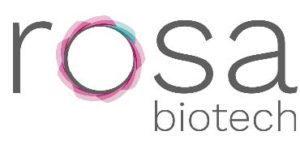
Rosa Biotech is a University of Bristol spinout company developing a peptide-based biosensor for detecting complex mixtures of analytes. We are looking for a PIPS intern to join our team based at Unit DX, a biotechnology incubator in Bristol. The student will assist our CEO with market research and developing the company brand, as well as help our lab team to build our technology platform. The placement will be an excellent opportunity for a student to gain experience working for an early-stage spinout company in the biotech sector.
Internship title: Developing the brand, assessing the market landscape and building the technology platform for a biosensing spinout company.
Ideally to start in early 2020 but this is flexible.
2019 Rosa Biotech – CLICK HERE for more information
How to apply
If interested, please send a CV and cover letter to intern@rosabio.tech. If suitable, you will be invited to interview and we can discuss where in the company you would be best deployed.
Deadline for applications: 9th November 2019
Contact
Arne Scott
Senior Scientist
Unit DX | Albert Road | Bristol | BS2 0XJ
Website: rosabio.tech | Twitter: @rosabiotech
LinkedIn: linkedin.com/company/rosabiotech
Dr Patricija van Oosten-Hawle – Staff Showcase
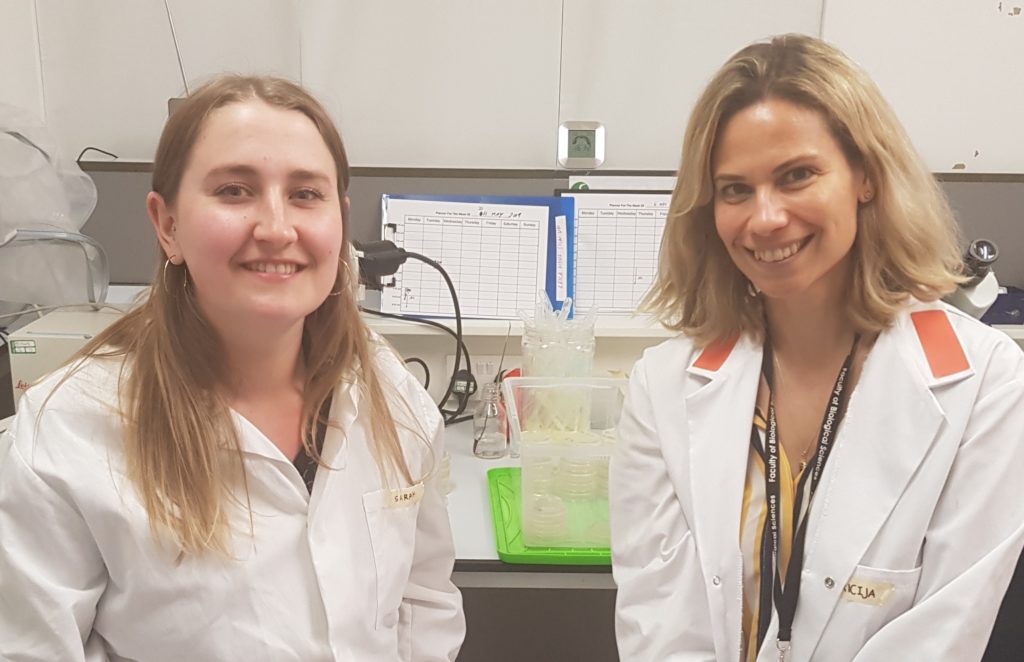
Biography
I always wanted to become a scientist, from observing microorganisms under the microscope to understanding molecular structures and how the cell works. This is why I studied Chemistry and Biochemistry at the University of Vienna, Austria before finishing my MSc degree work at the University of Bonn, Germany. This was followed by PhD studies at the VU University in Amsterdam in the laboratory of Prof. Saskia van der Vies and Dr. Marco Siderius, where I focussed on the interplay of the Hsp90 chaperone machinery in stress-responsive MAP kinase signalling pathways in yeast.
Shauni McGregor – International Poster Prize
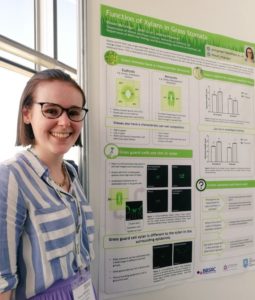 Shauni McGregor is a plant biologist based at the University of Sheffield. Her PhD, which she began as part of the 2017 cohort, is entitled The Mechanics of Stomatal Function and focuses on plant gas exchange and water use, specifically in grasses and cereals.
Shauni McGregor is a plant biologist based at the University of Sheffield. Her PhD, which she began as part of the 2017 cohort, is entitled The Mechanics of Stomatal Function and focuses on plant gas exchange and water use, specifically in grasses and cereals.
Recently, Shauni has gained recognition at an international level. At the Society of Experimental Biology’s Annual Meeting in Seville, Spain, Shauni received an award for the best poster in the Stomatal and Photosynthetic Regulation of Water Use Efficiency session. Generously sponsored by ADC Scientific, the award was judged not only on the poster itself but also on a two-minute ‘flash talk’ delivered during the session to a sizeable audience.
Lewis White – Student Rep
 Being a DTP Student Rep can provide much fun and valuable skills development. Read Lewis White’s journey here:
Being a DTP Student Rep can provide much fun and valuable skills development. Read Lewis White’s journey here:
Lewis began his PhD in 2016. Supported by his supervisor, Dr Kanchon Dasmahapatra of The University of York, Lewis is researching: Life in extreme environments: adaptation and evolution of African soda lake fishes.
He volunteered to take on the role of a Student Representative for the White Rose BBSRC Doctoral Training Partnership (DTP) in his first year and enjoyed the role so much that he plans to continue the role into his fourth and final year, from October 2019. His contribution to the work of the DTP has proved invaluable. In particular, planning and running an annual Symposium for just under 300 PhD students across the partnership is a huge responsibility that has been capably handled by Lewis, leading the current team of Student Reps (five reps in total). This has had the advantage of ensuring the Symposium is student-friendly, whilst retaining the highest academic standards. The detailed project planning has been exemplary, with the added benefit of allowing the DTP Co-ordinator to have an oversight and freeing up her time for other DTP tasks. The student feedback on DTP training courses presented to the Management Board has positively influenced the development of the training programme for the new academic year. Lewis’s leadership skills, teamwork, communication skills, commitment and his enthusiastic approach are much appreciated by the DTP Management Board.
Enterprising Year 2s!
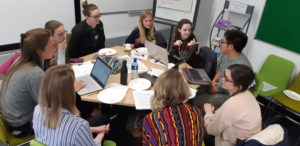
Check out the pics of our Year 2s putting enterprise learning into action – creating translational pathways from product idea to market – and presenting innovative solutions at our two-day Enterprise Training.
i-CASE 2020 entry competition
The competition for entry for i-CASE projects within the White Rose BBSRC DTP is now open.
Academic staff can apply for a CASE project to fit into the recruitment cycle for student entry in October 2020.
The deadline for applications is Monday 30th September 2019 (12 noon).
Cambridge Cancer Genomics – Software Engineer Intern – Rolling deadline

Click the link below to access the PIPS opportunity details and information about how to apply:
2019-Cambridge-Cancer-Genomics-Software-Engineer@Aug19
Note that the funding offered by Cambridge Cancer Genomics is in addition to your standard PIPS allowance for travel and accommodation (£2,050 @ the time of writing).
Royal Society of Biology – Deadline: 12th Aug 2019
The Royal Society of Biology (RSB) has two internship positions available for current PhD students who are funded by AHRC, BBSRC, EPSRC, ESRC, MRC, and NERC.
Successful applicants will spend three months working at the RSB in Central London in 2020. Start and end dates can be negotiated as appropriate.
More information can be found on the RSB website.
Closes: 12 August 2019
Eleanor Kirby-Green MRSB
Education Policy Officer
Tel: 020 3925 3463
Royal Society of Biology | 1 Naoroji Street | London | WC1X 0GB
Follow us on Twitter @RoyalSocBio Find us on Facebook
BBSRC alternative proteins – Deadline: 12 Aug 2019
Advert for UKRI-BBSRC PIPS intern – Alternative Protein Sources in the Food System
1. Summary
UKRI-BBSRC is recruiting for an enthusiastic and capable PIPS intern to lead a project on ‘alternative protein sources in the food system’. The successful applicant will gain experience on how research strategy and policy is developed and implemented, whilst developing transferable skills that can be used in their research, including synthesizing key information to inform different audiences, providing thought leadership in an interesting and emerging area, and presenting findings to senior members of UKRI-BBSRC, academia, industry, and policymakers.
2. Role of the PIPS Intern
The purpose of this proposed project is to understand future requirements for protein consumption and the opportunities for research and innovation to meet these requirements. Evidence will be collected through portfolio analysis, scoping relevant literature, and stakeholder engagement with industry, policymakers, and members of academia.
The process by which the project is conducted will be developed by the PIPs intern, with guidance and support from Senior Managers within the Capability and Innovation Doman, and the Research Strategy and Programmes in UKRI-BBSRC.
Outcomes of the project will be disseminated to Senior Leaders within UKRI-BBSRC and the Global Food Security programme, and will help to inform future BBSRC research strategy, shaping priorities in our three strategic priority areas: Sustainable agriculture and food, Renewable resources and clean growth, and An integrated understanding of health.
3. Experience gained on the project
-
- Opportunity to provide thought leadership in an emerging area of research and innovation.
- Synthesizing information to inform different audiences, including senior members of UKRI-BBSRC, academics, industry and policymakers.
- Presenting work to senior academics, members of industry, and policymakers at Strategy Panel meetings.
- Experience of cross team and organisation working work the Capability and Innovation Domain and the Strategy and Programmes Group within UKRI-BBSRC.
- Experience of liaising with external stakeholders and grant holders
- Further develop planning and project management skills, in order to meet deadlines
4. Background to the project
Food and drink contributes £31.1bn to the economy, and is the single largest manufacturing sector, larger than automotive and aerospace combined. The industry is of strategic importance in enabling the United Kingdom to meet the challenges of providing a nutritious, safe and sustainable supply of food to a growing and ageing population in a world with increasing scarcity of resources.
The sector is intensely competitive and, apart from a small number of large companies, it is dominated by small and medium enterprises (SMEs) operating on low margins.
In the context of an increasing world population, with an increasing demand for dietary protein further driven by the growth of the global middle class, maintaining global food security may require novel sources of dietary protein. Alternative proteins (protein sources that can act as substitutes for animal and aquaculture feed, and for traditional animal-based food) have garnered greater attention in recent years, with the formation of start-ups that are growing agricultural products directly from cell cultures, and SMEs using methanogenic organisms to create new sources of protein.
BBSRC released its Strategic Framework for Research in Agriculture and Food Security in 2017. The framework encourages strategically relevant research that will enhance UK and global food security by providing knowledge and evidence to farmers, food producers and manufacturers, retailers and consumers. Step changes in biological understanding of crops and farmed animals, and new disruptive technologies, will help address the agri-food challenges globally, whilst benefiting the UK economy by opening up new markets for exports.
It is unclear how this alternative proteins sector will develop in the next 5 to 10 years, and therefore BBSRC wishes to undertake horizon-scanning to predict the research and innovation needs associated with protein sources, and build on initial findings from the PIPs intern.
5. Application process
If you are interested in applying for the PIPS placement, please complete the attached application form and return it to pips@bbsrc.ukri.org by 23:59 on Monday 12th August 2019.
Download Application Form Here
BBSRC will host Skype interviews on Thursday 15th and Friday 16th August 2019.
Applicants should be available to commence the placement from Monday 2nd September 2019, although UKRI-BBSRC can provide a degree of flexibility in regards to the starting date. The PIPs placement will be for a duration of 3 months.
6. Key contacts in UKRI-BBSRC: Dave O’Gorman – Senior Innovation Manager, Business Interaction Unit, Capability and Innovation Domain (David.OGorman@bbsrc.ukri.org)
Andrew Hellewell – Strategy and Policy Manager – Agriculture and Food Security, Research Strategy and Programmes (Andrew.Hellewell@BBSRC.ukri.org)
BBSRC GCRF impact and communications strategy – Deadline: 13 Sep 2019
Professional Internship opportunity:
Shaping BBSRC’s impact and communications strategy for the Global Challenges Research Fund (GCRF)
Within BBSRC’s Global Challenges Research Fund (GCRF) Hub, there is an exciting opportunity for a Professional Internship for PhD Students (PIPS) placement to input into the development and delivery of BBSRC’s impact and communication strategy for GCRF. This interesting and challenging internship will provide an intern with insight into strategy development by the UK’s leading bioscience research funder and impacts of the UK’s Official Development Assistance (ODA) investment
Background to GCRF
The Global Challenges Research Fund (GCRF) was established in the 2015 Spending Review, to ensure that UK research takes a leading role in addressing the problems faced by low and middle income countries (LMICs). The GCRF deploys the UK’s world-class research capability to address the challenges faced by the Global South. It forms part of the UK Government’s pledge to allocate 0.7% of Gross National Income to ODA, with the primary goal of promoting the welfare and economic development of developing countries.
UKRI BBSRC and other Delivery Partners work collectively as well as through individual allocations to invest via GCRF. Since 2016, UKRI BBSRC has invested its GCRF individual budget allocation through a wide-ranging portfolio of activities aimed at supporting the development of capacity as well as in providing the foundations for research partnerships.
As the first wave of GCRF investment comes to an end, we want to capture and communicate the impacts of this significant investment and consider potential future opportunities for BBSRC bioscience to contribute to tackling global development challenges (pending the outcome of future Government spending reviews).
Role of the PIPS intern
We are looking for a PIPS intern to join BBSRC’s GCRF coordination hub, where they will work to support the development of forward strategy for potential future GCRF investment, as well as providing evidence to showcase the impact of BBSRC’s existing GCRF portfolio. This is a varied and interesting role working on a high profile funding stream. The intern will gain experience of BBSRC and wider UKRI strategy and policy development, as well as an understanding of the research for international development. They will:
Work with the GCRF Hub to develop the GCRF impact and communications strategy.
- Write case studies for publication for a range of audiences (including the general public, government, researchers) demonstrating the impact of BBSRC GCRF activities
- Carry out analysis of BBSRC’s GCRF portfolio of investments to inform future strategy development
- Input into the development of forward strategy for capture and communication of impact.
If you would like to apply for this PIPS placement, please complete the Application Form and return it to pips@bbsrc.ac.uk by September 13th 2019. You should be available to start your placement in Late Autumn / early winter 2019.
Click here to download the Application Form
Questions on this placement can be directed to:
Dr Frances Medaney (frances.medaney@bbsrc.ukri.org) or
Dr Stephanie Williams-Blackwell (Stephanie.blackwell@bbsrc.ukri.org)
UKRI Policy Internships – Deadline: 12 Aug 2019
UK Research and Innovation (UKRI)
Policy Internships Scheme
The Policy Internships Scheme provides the opportunity for doctoral students funded by the research councils of UK Research and Innovation to work for three months in one of a selected group of highly influential policy organisations.
- Call status: Open
- Call opening date: 18 June 2019
- Call closing date: 12 August 2019
For BBSRC students
PIPS opportunity – BBSRC Policy Internships – Deadline: 12 Aug 2019


Call status: Open
Application deadline: 12 August 2019, 16:00
Summary
This is a 3-month internship opportunity for Research Council-funded PhD students to work in one of a selected group of highly influential science policy organisations. Typically, students on these internships will be expected to:
- produce a briefing paper
- participate in a policy inquiry, and/or
- organise a policy event
CLICK HERE FOR MORE INFORMATION ON THE BBSRC WEBSITE
in vivo skills funding call 2019
Deadline: applications must be received by midnight Friday 28th June 2019.
PIPS opportunity – The Royal Institution (RI) – deadline 1 July 2019
The closing date for receipt of applications is midnight on Monday 1 July and interviews are scheduled to be held on Thursday 11 July.
The Royal Institution (Ri) is looking for an intern to start in late September 2019 to assist the Ri team with administering and delivering its programme of masterclasses. This placement will involve working with the Ri during its busiest and most exciting time of year and would be ideal for anyone interested in learning more about maths enrichment activities in an educational setting, and STEM communication more generally. It is a full-time 12 week placement working Tuesday to Saturday, based in Central London with the requirement to travel to Masterclass sessions in London and the South East. Students will therefore be expected to base themselves within or near to London for the period of the placement. I understand that some funding bodies/DTPs offer expenses for this purpose.
CLICK HERE FOR FULL JOB DESCRIPTION
For more information about our internship programme and details on individual placements, timeframes and how to apply, CLICK HERE
PIPS opportunity – Academy of Medical Sciences Grants and Programmes for 2019-20
The Academy of Medical Sciences is pleased to open applications to our Grants and Programmes internship scheme for internships in 2019/20.
The scheme is open to BBSRC-funded PhD students through the PIPS scheme.
Students spend three months at the Academy offices in central London. The scheme is designed to give students first-hand experience of the research funding and career development sectors, and to build valuable networks with the UK’s most eminent medical scientists and senior science and health stakeholders.
More details can be found at https://acmedsci.ac.uk/about/administration/internship-schemes.
Contact:
Dr Kim Hutchings
International Grants Manager
The Academy of Medical Sciences
41 Portland Place
London W1B 1QH
+44 (0)20 3141 3234
Rebecca Hall prize winner!
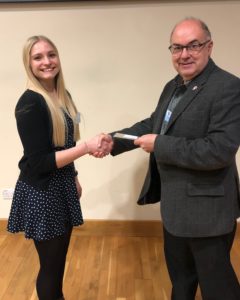
Rebecca Hall began her PhD as part of the DTP 2015/16 cohort at the University of York. Her project title is: The microbiome of the tsetse.
She has presented her work at numerous local and national events to universal acclaim. Within the department at York she has won KM Stott Prizes for both her 1st year poster presentation and her final year talk as well as a Science Faculty Prize for PhD Spotlight competition at YorkTalks. She also won a White Rose BBSRC DTP prize for the best final year talk.
2018 Symposium Successes!
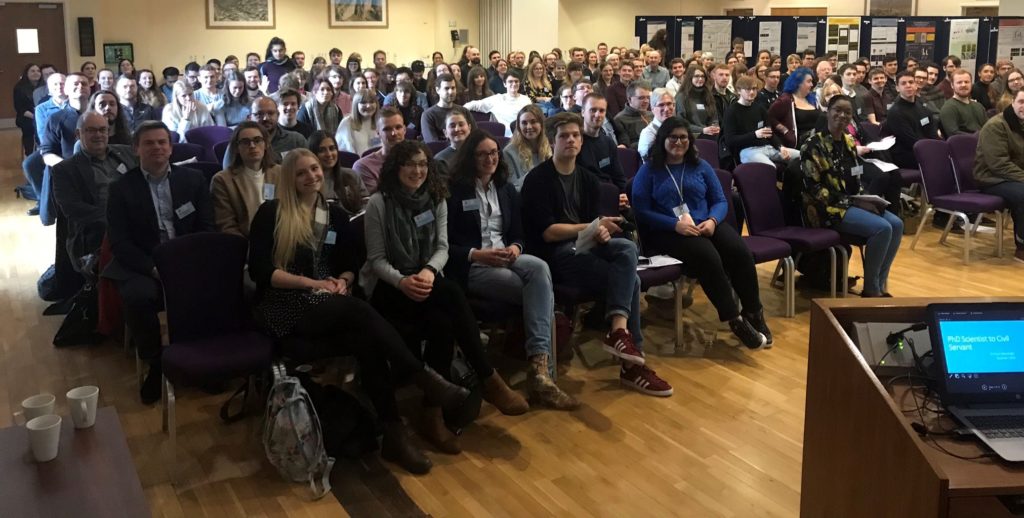
Our latest White Rose BBSRC Doctoral Training Partnership (DTP) Symposium was held in December 2018, hosted by The University of Sheffield.
Women of Achievement 2018: Dr Katie Field
Highlighting the accomplishments of Dr Katie Field
Dr Katie Field is a supervisor at the University of Leeds – an example of the high calibre staff supporting our PhD students within the White Rose BBSRC Doctoral Training Partnership. 
Dr Field, an Associate Professor in the School of Biology, is a superb scientist with extraordinary capacity for interdisciplinary innovation and has internationally-recognised expertise in symbioses between plants and fungi.
Katie was awarded the Philip Leverhulme Prize in Biological Sciences in 2017 for her research on the diversity and evolution of plant-fungal symbioses. These prestigious prizes recognise the achievement of outstanding researchers, whose work has already attracted international recognition and whose future career is exceptionally promising.
Advice on how to transition from PhD to Senior Lecturer
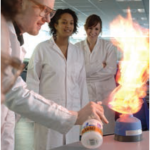 See the following link for advice from Helen Coleman, who is a senior lecturer in cancer epidemiology at the Centre for Public Health at Queen’s University Belfast.
See the following link for advice from Helen Coleman, who is a senior lecturer in cancer epidemiology at the Centre for Public Health at Queen’s University Belfast.
Career advice for students considering a career in academia
While you are on the Times Higher Education website, it is worth browsing as you will find plenty of advice, blogs etc of relevance. You will need to register before you can read any articles.
Issue 2 of our student-run DTP Newsletter
 Our DTP students have produced the second issue of the DTP newsletter. Many thanks to the editorial board and all our student contributors for all their hard work. Please take the time to read this, on the last page there is info about how to get involved and submit your own contributions for future issues.
Our DTP students have produced the second issue of the DTP newsletter. Many thanks to the editorial board and all our student contributors for all their hard work. Please take the time to read this, on the last page there is info about how to get involved and submit your own contributions for future issues.
Read it here:
Dragon’s Den Winning Teams
Our second year students worked together in cross-institutional teams to develop business ideas, which they presented to a panel of expert innovation and industry ‘Dragons’ at the Fera Training Day. There were moments of sheer brilliance, fun and a little bit of terror when faced with the Dragon’s questions. The Dragons were impressed with the students’ research into the commercial aspects of their business idea and it was difficult to choose a winner but after much discussion the Dragons were able to select the winning and runner-up teams.
Here are the teams receiving their prize from our External Advisory Board member Rose Maciewicz, VP Strategy Respiratory and Inflammation iMed at AstraZeneca:
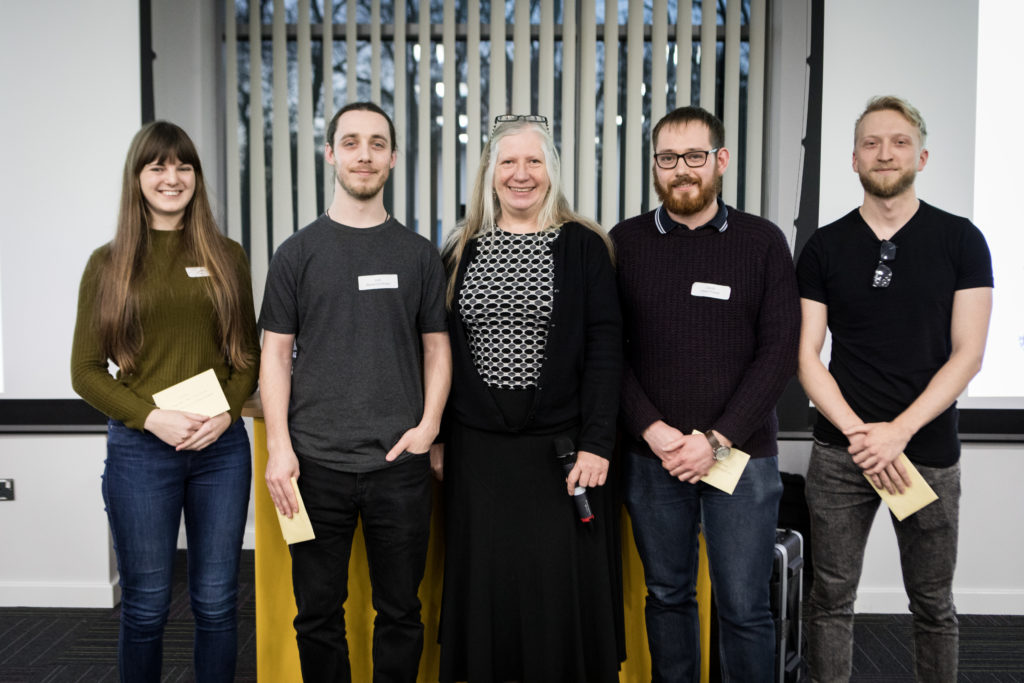
Philip Kirk, Leeds
Sarah Flannery, Sheffield
Paul Bond, York
Oliver Prosser, Leeds
Matt Chadwick, Leeds
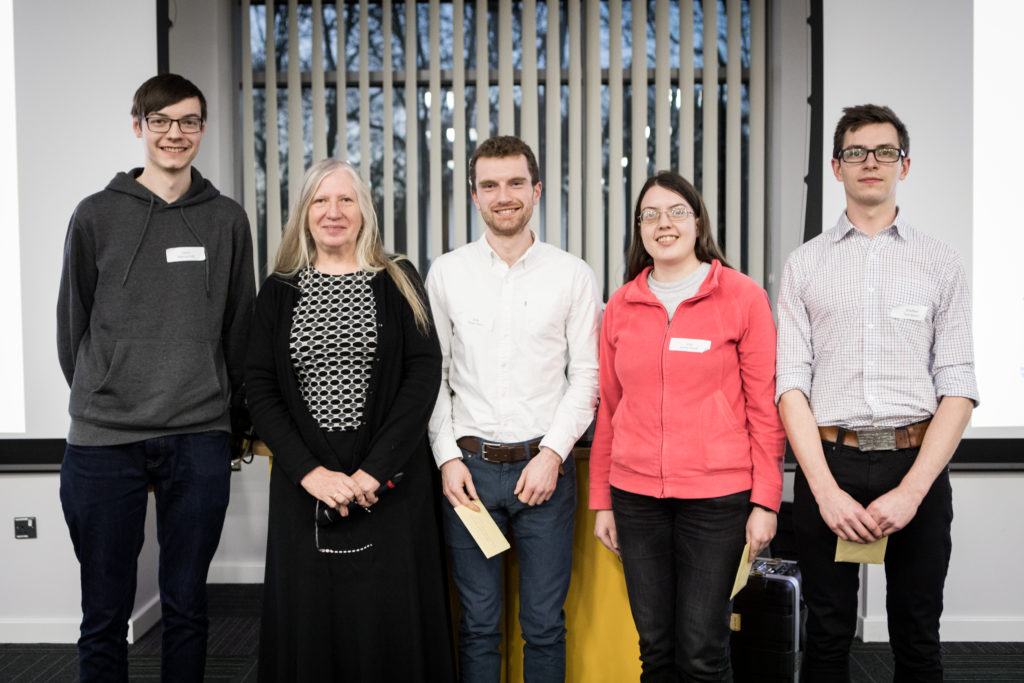
Marcus Holt, Leeds
Jenny Hayes, York
Tom Burns, Sheffield
Oliver Herd, York
Sarah Good, Leeds
Prizes galore at our DTP Research Symposium in York
The White Rose BBSRC DTP Research Symposium was held at the University of York on 15th Dec 2017 and showcased the work of our third year and final year students. This was organised by a committee of our DTP students, led by York student Lewis White, and was a great success.
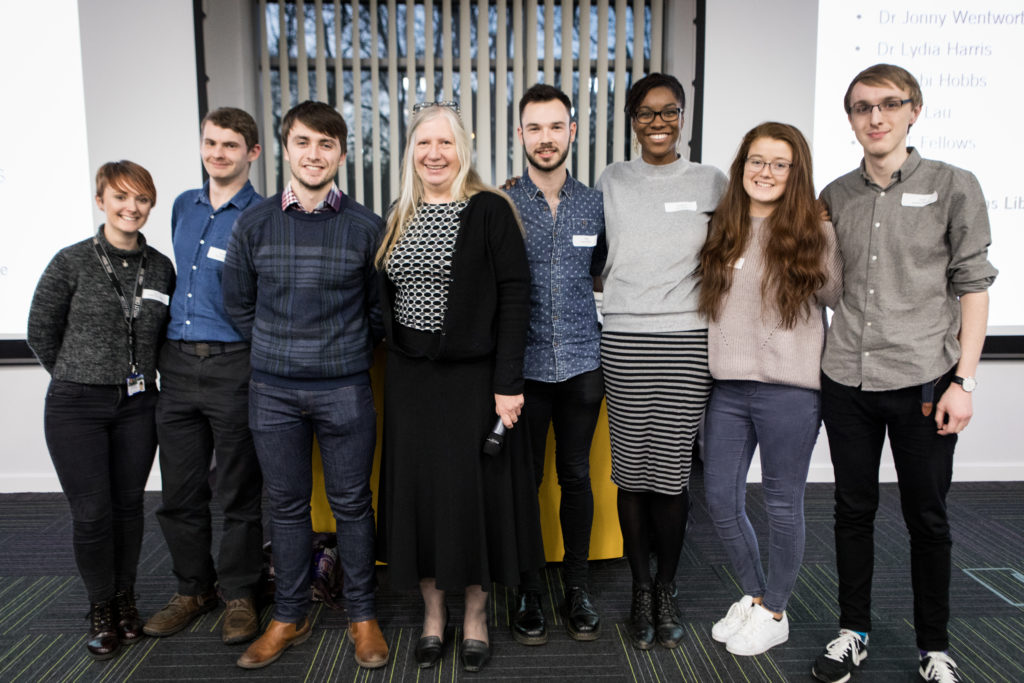
We would like to congratulate all the students for their high quality presentations and posters, which were very well received by the symposium delegates. The winners of the presentation and poster competitions were very well deserved and had to fight off stiff competition from their fellow students.
Here are all the winners receiving their prize from our External Advisory Board member Rose Maciewicz, VP Strategy Respiratory and Inflammation iMed at AstraZeneca:
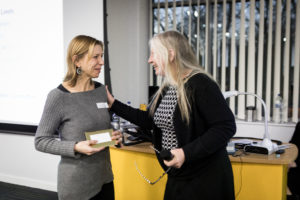
Giovanna Pesante, York
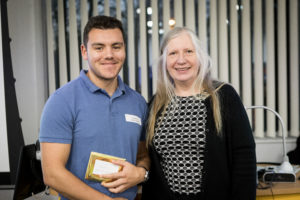
Jordan Talbot, Sheffield
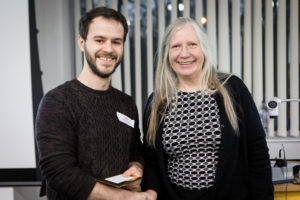
Joseph Ward, Leeds
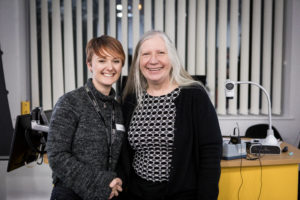
Caitlin McQueen, York
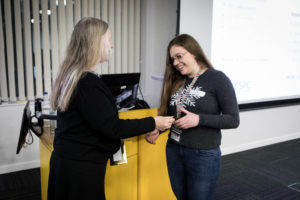
Emma Stewart, York
Job advice from Sarah Blackford
See Sarah’s post on the importance of your personal network when looking for a job:
She regularly adds new posts here:
All our third year DTP students have the opportunity to attend a career planning session with Sarah Blackford at the Fera Training Day on 20th Nov 2017. Sarah is an academic career consultant with a background in bioscience research and scientific publishing. Qualified with a master’s degree in career education and guidance, Sarah has over 15 years’ experience of delivering specialised career support to PhD students and early career researchers in the form of career development workshops and one-to-one coaching. Her workshops, which are based on her book, “Career planning for research bioscientists”, include career issues such as self-awareness, how to make informed career choices, the job market and finding opportunities outside of academia, networking and communication, CV writing and successful interview technique. Sarah believes that effective personal career development lies at the heart of a successful and fulfilling career.
DTP Newsletter – run by students for our students
Our DTP students have formed an editorial team to produce a DTP Newsletter as a way of improving the communication and networking between our three universities. The Editor in Chief Caitlin McQueen says:
‘We hope that this newsletter will help build friendships throughout the three universities to achieve a real sense of support and involvement outside of the arranged sessions we attend during the year.
The really exciting part about this newsletter is that it is completely student run- this means that if you have something that you want to talk about, or a suggestion for a future section/recurring article, you have the ability to do so! I really think this newsletter has the potential to get us all helping each other in labs, sharing techniques and woes, but also to get everyone involved in our “other lives” not quite so freely shared with each other- so if you’re fundraising for charity, wanting some support for your band, or your sports team, please use this opportunity to get us all supporting you!
In our first issue we will be talking to some PIPs survivors to get some advice and inspiration for potential placements, we will have some scientific features articles from the cohort and a feature on the recent second year visit to the Research Complex at Harwell in Oxford. We will also be saying goodbye to our first round of PhD students and will be catching up with a few to see what they have lined up post thesis submission’
You can read the first issue of the Newsletter here:
The second issue of the Newsletter is currently in production. Please look out for requests from the Editorial Team – all help gratefully received!
New DTP Newsletter – Run by students for students
A new student-led DTP Newsletter will be launched shortly. Please look out for invitations from the editorial team to submit your own news items. The Newsletter will contain useful information directly relevant to yourselves including scientific features, interviews, information about PIPS and future careers as well as news items from your fellow DTP students.
Prize winning DTP Students
The White Rose BBSRC DTP Research Symposium was held at the University of Leeds on 15th Dec 2015 and showcased the work of our final year students.
We would like to congratulate all the students for their high quality 3 min thesis presentations and posters. The winners of the 3MT and poster competitions were very well deserved and had to fight off stiff competition from their fellow students. Here are all the winners receiving their prize from Robert Hardwick, BBSRC:
